#Ards and North Down
Explore tagged Tumblr posts
Text
Ards And North Down Arts And Heritage Summer Programme Unveiled
Ards and North Down Borough Council proudly presents its Arts and Heritage Summer Programme, spanning the May to August period. Bursting with an array of events, exhibitions, and creative classes, alongside exciting events at Ards Arts Centre and North Down Museum, the diverse programme offers cultural experiences for everyone. Highlights from the Arts and Heritage Summer programme include the…

View On WordPress
0 notes
Text
Thistles of Beleriand
Continuing my flower world building from last year where I do flower related world building! More in the spring flower game tag! This was a request from last year!
Thistles are a common name for several species with leaves that have sharp spikes on their edges. Most of them are in the Asteraceae family. They are ecologically significant with their seeds being eaten by many species of birds, playing part in the lifecycle of several butterfly species, and containing notably high amounts of nectar.
Dozens of species of thistle live in Beleriand. A high number of them are globe thistles, one of the largest genuses, but many others are represented as well. The area of highest diversity is in the south of Beleriand.
The feathery part of the thistle flower is called down and it is often collected by birds to line nests. The fibers can be spun into a yarn like material. In Mithrim and Nevrast, these plants are cultivated specifically for fiber, often dyed with other parts of the plant. These fibers are generally used in smaller amounts such as lining in blankets. Children's dolls are often made with thistle fiber, a time consuming and precise task.
Purple milk thistles and star thistles (a genus of about seventy species) are found in southern Beleriand around the Andram. They're eaten by Avarin elves and are a part of medicine, often through teas.
In Nevrast as well as in the gardens of Valinor, larger species of thistles such as the creeping thistle are beloved for their ability to attract hummingbirds and fritillary butterflies.
The leaves and roots of golden thistles are eaten in the Havens of the Falathrim, often with fish and eggs of chickens or quails. The flowers themselves appear in Falathrim art, often representing the sun, change and beginnings.
Like many native flowers, thistles in Hithlum often appear in Hadorian embroidery and architectural motifs. Cotton thistles, thorny burr, and milk thistle being the most common. Thorny burr is also cultivated for their edible roots.
Musk thistles are found in north eastern Beleriand, namely in Ard Galen and the moors of Dorthonion.
#the silmarillion#musing and meta#beleriand#spring flower game#valinor#sindar#hithlum#dor lómin#falathrim#nevrast
47 notes
·
View notes
Text
New Ghoul Creation & Summoning:
As performed only by a Papa, in the lowest sanctum of the Ministry
Required Materials:
Red chalk
Three ritual candles
A lighter
The Summoning Book (specific chants within)
The Ritual Steps:
Enter the Summoning Room. Proceed to the centre of the chamber, where the ritual will take place.
Draw the Ritual Circle.
Take three steps north from the room's centre.
Using the red chalk, draw a perfect circle around the middle of the room.
Inscribe the Elemental Symbol.
Return to the centre of the circle.
Carefully draw the symbol of the Element (Fire, Water, Earth, Air, Aether) for the ghoul you wish to summon.
Place the Ritual Candles.
Go to the altar and retrieve three candles.
Place each candle at one of the three key points of the Elemental Symbol.
Once placed, light all three candles in clockwise order.
Prepare the Chant.
Return to the altar and set down the lighter.
Open the Summoning Book to the page of the correct incantation—each ghoul has their own unique chant.
Begin the Invocation.
Stand at the northernmost point of the circle.
Close your eyes and open your arms slightly in a welcoming stance.
Begin to recite the chant aloud.
The Descent:
The chalk circle will glow brightly, flashing first the colour of the summoning Papa (e.g., red, green, purple), then shifting to the elemental colour of the ghoul.
The ground will tremble, the air thickening with brimstone and ozone.
The floor beneath the circle splits, revealing a chasm to Hell.
A massive, shimmering hand will emerge from the void, selecting a ghoul at random from the pit.
The ghoul is placed gently onto the summoning floor. As the hand withdraws, the Hellmouth seals itself.
The Arrival:
The ghoul appears naked, their body steaming slightly from the transition.
They speak only their native tongue and are unfamiliar with human language or customs.
They are to be clothed, fed, and sheltered immediately.
A period of acclimation and naming will follow, guided by the Papa and the Clergy.
The name will be given to them by another ghoul who is fluent in their language and then translated by said ghoul to the Papa and Clergy.
The Grimoire of Summoning
A sacred and infernal text used by the Papas to summon ghouls from the depths of Hell.
Contents of the Grimoire:
Introduction to Ghoulkind: Origins, elemental classifications, known behavioural patterns, and a warning on treating ghouls with respect and reverence.
Summoning Preparations:
Required materials (red chalk, candles, lighter, summoning space)
Ritual cleanliness and mental focus guidelines for the summoner
Summoning Circle Instructions: Step-by-step layout of the summoning ritual (as you described)
Elemental Symbols & Candle Placement Diagrams: Visual illustrations for drawing the correct elemental sigils
Naming the Ghoul:
Guidelines for interpreting their native name and choosing a humanised version
Naming traditions and examples (e.g. Dewdrop, Ifrit, Aether)
Post-Summoning Care:
Providing clothing, teaching them Latin or English
Psychological acclimation to the human world
Integration with the Ministry and bonding rituals
Disciplinary Protocols & Banishment Rites: Rarely used, but included for emergencies or betrayals
Ghoul Summoning Chant
🜂 Fire:
Ignis inferni, surge ex abyssum.
Sanguine signatum, vinculo flammæ ligatum.
Ad voluntatem Pater Noster Inversus,
Arde, vive, serva.
Per hoc sacrificium, in carne revenias.
Exaudi me—aperi portas damnat
🜄 Water:
Aqua obscura, ex tenebris nata,
Frange silentium cum undis.
Serpens fluentis, vocamus te.
Sub signum sacrilegum, exsiste.
Dona nobis vastitatem maris.
Exaudi vocem meam, surge
🜁 Air:
Spiritus ventorum, invisibilis et acer,
In nomine eius qui non est sanctus.
Volita super tenebras,
Porta nuntium damnationis.
Surge ex vacuum—veni ad me.
🜃 Earth:
Terra mortis, ossa antiquorum,
Exaudi cantum sacrilegum.
In pulvere peccatum nascitur,
Sub radicibus daemon latet.
Excute catenas inferni,
Et da nobis fortitudinem damnatorum
𝓠 Quintessence:
Essentia ultimum, lux tenebrarum,
Inter mundos vagaris.
Vox sine forma, vis sine carne,
Per voluntatem Inversi Patris,
In somnio, in sussuro, in pulsu occulto—
Aperi te nobis.
Veni, figmentum stellarum,
Et sit inter nos iterum
(This chant is often whispered rather than chanted, and is known to cause flickering lights, vertigo, or sudden silence in the summoning chamber. Some Papas report hearing their own thoughts spoken aloud during it — though not in their own voice.)
#the band ghost#ghost bc#ghost band#my own lore#lore drop#lore dump#lore#world building#in my own world#nameless ghouls
24 notes
·
View notes
Text
Okay, this is really nitpicky, but I have to say it. When the Fëanoreans landed in Middle-earth, Celegorm did not lead an army south and relieve the siege of the Falathrim. I’m seen that referenced or mentions in a lot of meta and fics, but it never happened. And there is no indication that Celegorm even met Círdan or any of his people, or was even aware of them prior to Fingolfin’s forces arriving.
What happened was that Morgoth reacted to the Fëanorean forces’ arrival by pulling his army besieging the Falathrim away and sending it north towards Ard-galen. And then, when it was in the north, far from the Falas, attacking the Fëanoreans, Celegorm defeated that army.
Yes, this is minor, and yes, it’s beneficial to the Falathrim that the arrival of the Fëanoreans made Morgoth decide he needed that army more elsewhere, but there is no direct “showing up and rescuing them” moment, and none of the Fëanoreans are anywhere near the Falas during the Battle-under-Stars, and Celegorm has no more to do with the benefit to the Falathrim than anyone else does (though he gets the Fëanorean forces out of a tight spot) and this just seems to be a weirdly common fanon misconception?
Under the cold stars before the rising of the Moon the host of Fëanor went up the long Firth of Drengist that pierced the Echoing Hills of Ered Lómin, and passed thus from the shores into the great land of Hithlum; and they came at length to the long lake of Mithrim, and upon its northern shore made their encampment in the region that bore the same name. But the host of Morgoth, aroused by the tumult of Lammoth and the light of the burning at Losgar, came through the passes of the Ered Wethrin, the Mountains of Shadow, and assailed Fëanor on a sudden, before his camp was full-wrought or put into defence; and there on the grey fields of Mithrim was fought the Second Battle of the Wars of Beleriand. Dagor-nuin-Giliath it is named, the Battle-under-Stars, for the Moon had not yet risen; and it is renowned in song.
The Noldor, outnumbered and taken at unawares, were yet swiftly victorious; for the light of Aman was not yet dimmed in their eyes, and they were strong and swift, and deadly in anger, and their swords were long and terrible. The Orcs fled before them, and they were driven forth from Mithrim with great slaughter, and hunted over the Mountains of Shadow into the great plain of Ard-galen, that lay northward of Dorthonion. There [in Ard-galen] the armies of Morgoth that had passed south into the Vale of Sirion and beleagured [EDIT] Círdan in the Havens of the Falas came up to their aid, and were caught in their ruin. For Celegorm, Fëanor’s son, having news of them, waylaid them with a part of the Elven-host, and coming down out of the hills near Eithel Sirion drove them into the Fen of Serech.
If you will indulge my very bad edit of the Beleriand map:
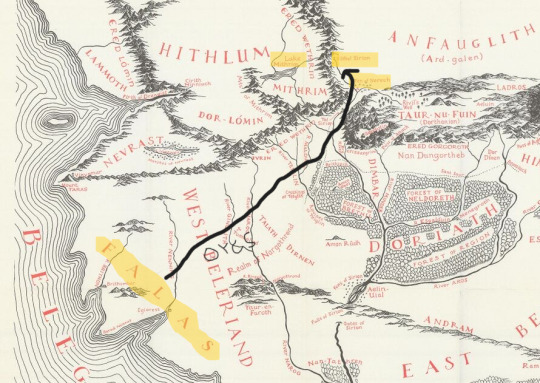
The orcs coming from across Ard-galen from Angband cross the mountains and attack the Fëanoreans up at Mithrim, in the top. The Fëanoreans drive them back over the mountains into Ard-galen. The orcs that were besieging the Falas, brought up as reinforcements for the other orcs, come up all the way into Ard-galen. Celegorm, attacking from Eithel Sirion (which is north of the Fen of Serech), drives them south into the Fen.
At no point in this are the Fëanoreans - Celegorm or other - anywhere near the Falas. Celegorm's actions have no more impact on the Falas specifically than anyone else's.
140 notes
·
View notes
Text
I Read The Silmarillion So You Don't Have To, Part Seven
Previous part.
Chapter 18: Of the Ruin of Beleriand and the Fall of Fingolfin In which everything goes to hell. Again.
Remember the Siege of Angband? Yeah, that’s still going on. It’s been roughly two hundred years since Morgoth’s last attack (the first appearance of Glaurung the Dragon), and in all that time, the Elves haven’t made much progress. Fingolfin, the High King of the Noldor, considers launching another assault on Angband; his people are strong, and now they have the Men on their side. What Could Possibly Go Wrong?

Fingolfin by Insant
The other Noldor are less enthused by this idea. For once, things are pretty great. Why risk the peace and prosperity that the Elves currently have for the chance at defeating Morgoth, when there’s bound to be massive loss of life either way? Only the Elven lords who live in the far north — on Morgoth’s doorstep — agree with Fingolfin, since they can’t ignore Morgoth as easily. They’re shot down by everyone else, so, there’s peace for a little while longer.
That’s when Morgoth makes his move.
Morgoth has been steadily gathering his forces throughout all of that time, and he’s also grown more and more spiteful. He doesn’t just want to defeat the Noldor, he wants to defile their homeland. But his hatred has also made him impatient.
One winter, on a dark night, without any warning, rivers of lava suddenly come pouring down the Thangorodrim, which belch poisonous gases into the air, rendering the whole plain of Ard-galen a barren wasteland overnight. Also, unlike with natural volcanoes, the damage is permanent — Ard-galen becomes known as Angfauglith, which means “Gasping Dust.” Instant Mordor, Just Add Lava. Many poor Elves are swallowed up by the lava before they can react.
As if that weren’t bad enough, Glaurung returns, accompanied by Balrogs and entire armies of Orcs — more Orcs than the Noldor have ever previously seen. The ensuing battle lasts all winter, as Morgoth’s forces return fire on the Noldor. It becomes known as Dagor Bragollach, the Battle of Sudden Flame.
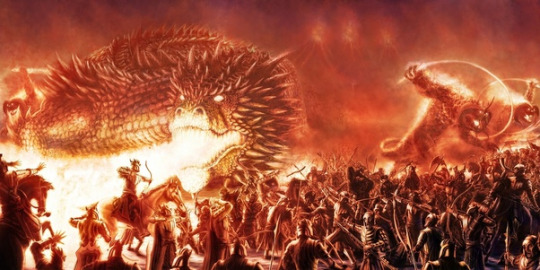
Battle of Sudden Flame by Jovan Delic
There are many casualties. Angrod and Aegnor, the brothers of Finrod and Galadriel, both die in the battle. Finrod himself gets cut off in the Fen of Serech, and almost dies, but he’s rescued at the last minute by a Man named Barahir. Finrod escapes with his life, barely, and manages to make it back to his palace in Nargothrond. Finrod pledges undying friendship to Barahir, promises to help him and his family in return if they should ever need him, and gives him his ring as a token of his promise. It’s a ring shaped like two intertwined snakes, set with green stones, and it becomes known as the Ring of Barahir.
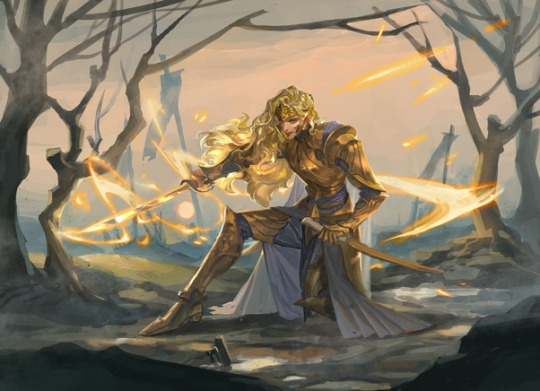
Finrod in the Fen of Serech by pansen1802
Incredibly, Fingolfin and co. manage to hang on to their land of Hithlum, but not without heavy losses. Hador Lórindol, one of the Kings of Men who was Fingolfin’s thane, dies in the battle. In the East, Fëanor’s sons aren’t doing great, either — Celegorm and Curufin are both defeated, but not killed; they retreat all the way to Nargothrond and hide there with Finrod. Caranthir’s land is ravaged, too.
Maedhros, however, “burned like a white fire.” He’s been dying to get his revenge on Morgoth for having strung him up on Thangorodrim, and personally slaughters so many Orcs that they start to run in fear of him. He manages to hang on to his fortress, and many people rally to him, including his brother Maglor.
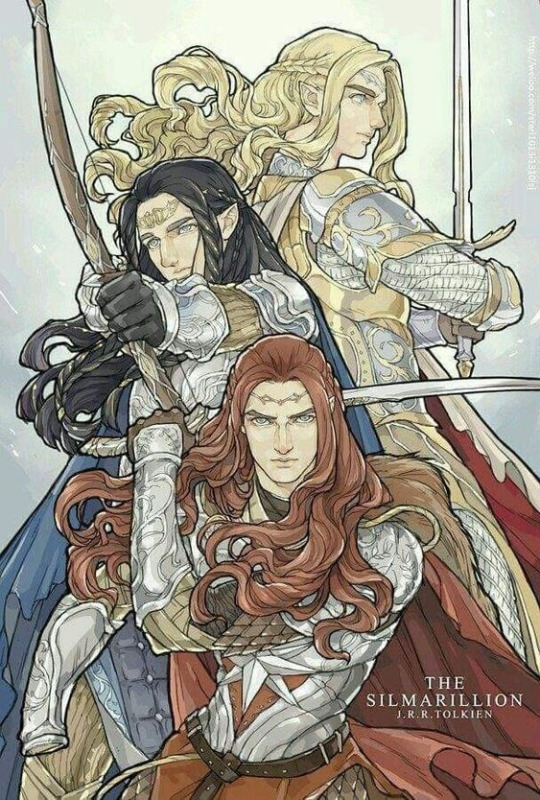
Finrod, Fingon, and Maedhros by star热爱生活呀巴扎嘿
Overall, the battle is really bad. Fingolfin stares out over the ruined lands, sees his family scattered, and realizes the Noldor are done for. He’s filled with rage and despair, but he isn’t ready to give up yet. There’s only one thing to do. He mounts his horse, Rochallor, and rides straight to the gates of Angband. Those who see him think he must be Oromë, the Vala of the hunt, because he burns with fury and his eyes glow. He blows his warhorn, bangs on the gates of Angband, and challenges Morgoth himself to a duel.
That may be the ballsiest move of any Elf so far (and yes, I’m counting Fëanor going up against an army of Balrogs).
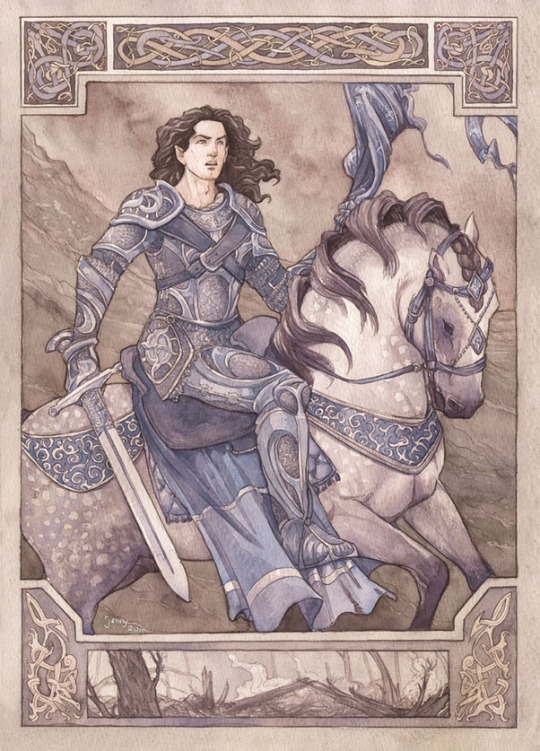
Fingolfin’s Challenge by Jenny Dolfen
Now, throughout all this, Morgoth has spent most of his time hiding in his fortress. Sure, he’s a Vala, and technically the most powerful being in Middle-earth, but he doesn’t fight his own battles. Fingolfin calls him a coward who’d rather send out all of his evil minions to fight for him than come and face him like a man. Morgoth can’t ignore that. So, to the surprise of everyone, Morgoth actually comes. And we get this badass description, which I’m going to transcribe, because I can’t do Tolkien justice:
Therefore Morgoth came, climbing slowly from his subterranean throne, and the rumour of his feet was like thunder underground. And he issued forth clad in black armour; and he stood before the King like a tower, iron-crowned, and his vast shield, sable-blazoned, cast a shadow over him like a stormcloud. But Fingolfin gleamed beneath it as a star; for his mail was overlaid with silver, and his blue shield was set with crystals; and he drew his sword Ringil, that glittered like ice.
Oh, it is on!
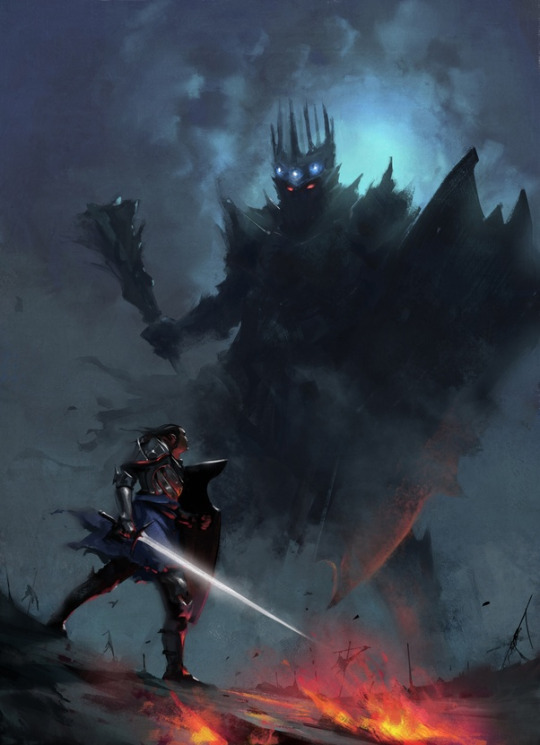
Fingolfin vs. Morgoth by Marchesi

The Fall of Fingolfin by Wavesheep
The battle is epic. Morgoth tries to smash Fingolfin with his hammer, called Grond (GROND! GROND! GROND! GROND!), but Fingolfin is too quick. Every time GROND hits the earth, it creates a volcanic cleft in the earth. The battle is compared to a thunderstorm, with the strikes of Morgoth’s hammer being the thunder and Fingolfin darting around being the lightning. Fingolfin actually manages to wound Morgoth, seven times! Each time, Morgoth howls so loud that all of the Orcs cringe in fear.
Fingolfin can’t keep it up forever, though. He’s mortal, and he’s going up against something near to a god. Three times, Morgoth crushes him with his shield, and three times Fingolfin is able to pick himself back up again. He doesn’t have much space to move anymore, because the ground around him is full of holes. He stumbles and falls, and Morgoth presses his foot to Fingolfin’s neck. It’s like getting an entire hill dropped on top of him. Fingolfin isn’t going to go peacefully, though — with his last bit of strength, he cuts deep into Morgoth’s foot.
Fingolfin dies, and thus passes the strongest and most valiant of the Elven kings. The Elves are so sad to lose him that they don’t even sing about the battle. The Orcs don’t gloat about it, either, even though Morgoth won — it was kind of a Pyrrhic victory, because it’s embarrassing that a mere mortal was able to do so much damage to Morgoth. The reason why we know what happened, despite the lack of songs about it, is because Thorondor (the King of the Eagles) brings the news to Gondolin and Hithlum.
Thorondor also saves Fingolfin’s body from being desecrated by Morgoth. Morgoth goes to throw Fingolfin’s corpse to the wolves, but Thorondor swoops down and claws him in the face. Thorondor brings Fingolfin’s body to Gondolin, and Turgon builds a cairn for his father in the surrounding hills. For a while, Fingolfin’s tomb acts almost like a charm that keeps the Orcs away. (But not forever though. Because, in case you forgot, Gondolin is doomed.)
Morgoth’s wounds are permanent. His seven initial wounds never heal, he now limps everywhere he goes because Fingolfin damaged his foot, and his face is also scarred where Thorondor got him.
All of Hithlum mourns Fingolfin’s death. Fingon, in his grief, becomes the sole High King of the Noldor.
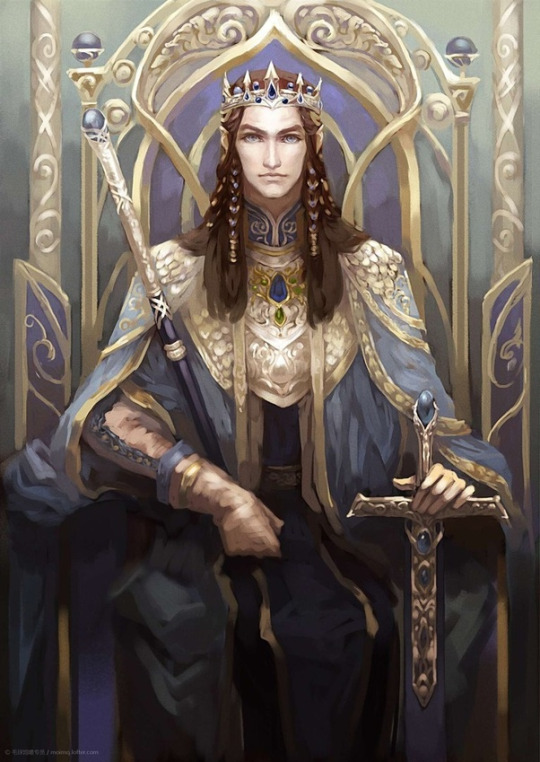
Fingon by Moimq
There’s an interesting note here: Fingon sends “his young son Ereinion (who was later named Gil-galad) […] to the Havens.” This is an outright inconsistency. In other sources, Gil-galad is the grandson of Angrod, Finrod’s brother. So, it’s legitimately unclear who Gil-galad’s father was. Oh well. Distant legendary past, oral tradition and all that. I’m sure the songs disagree on whose parents are whose all the time.
And, the “Havens” referred to here aren’t the Grey Havens, either. They’re two cities in the southwest of Beleriand. But they’re ruled by the same Elf, Círdan, who would rule the Grey Havens later.
Morgoth is now in control of most of northern Beleriand. Barahir, the Man who helped save Finrod, keeps fighting for some time, alongside his wife Emeldir. But Morgoth destroys their land little by little. That land becomes so dark and evil that even Orcs avoid it, and it gets a new name: Taur-nu-Fuin, “The Forest under Nightshade” (which is cool as hell). This forest is like a proto-Mirkwood. Its trees become tangled with claw-like roots and branches, and it becomes full of angry spirits that can drive travelers mad.
The situation gets so dire that Emeldir leads her people away. They end up in the Forest of Brethil, which is where Haleth, another badass warrior-queen of Men, led her people in a similar moment of desperation. All of Barahir’s men are killed fighting Morgoth except for a small handful (whose names are all listed, of course). The Elves don’t come to help them, so they become desperate, hunted outcasts who live in the wilderness. One of these outcasts is Beren, Barahir’s son, who’s about to become very important.
The Elves managed to maintain control over Minas Tirith, the tower that guards the pass separating Morgoth’s lands in the north from the rest of Beleriand. This tower is maintained by Orodreth, Angrod’s son and Finrod’s nephew. But after two years pass, the tower is besieged by Morgoth’s lieutenant, Sauron.
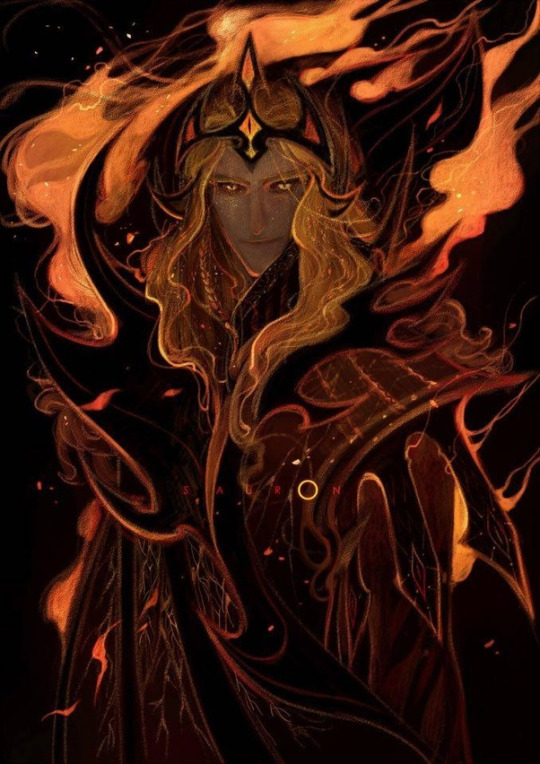
Sauron by Wavesheep
(Oh yeah I’ve been waiting to dip into my self-indulgent collection of Sauron pictures.)
At this point, the Elves call Sauron “Gorthaur the Cruel.” He has become…
a sorcerer of dreadful power, master of shadows and of phantoms, foul in wisdom, cruel in strength, misshaping what he touched, twisting what he ruled; his dominion was torment.
He’s basically like Morgoth 2.0, and there’s very little left of him that is still Mairon, the Maia smith that he once was. Still, Sauron and Morgoth aren’t interchangeable; while Sauron is certainly very evil, he doesn’t think the same way that Morgoth does. If you’re familiar with the D&D alignment chart, Morgoth is pure Chaotic Evil — he doesn’t have a motive beyond fucking things up as much as possible. Sauron is more Lawful Evil, more like an evil dictator. Morgoth wants to watch the world burn (and just did, a moment ago); Sauron wants to rule over the ashes.
Sauron’s assault on Minas Tirith is successful. (If Sauron had a nickel for every time he besieged a tower called Minas Tirith, he’d have two nickels, which isn’t a lot, but it’s weird that it happened twice.) He conjures a cloud of pure terror that causes Orodreth and his men to panic, and flee to Narthothrond. Then, much like Sauron would corrupt Minas Ithil and Osgiliath eons later, he transforms Minas Tirith into an evil watchtower. Tol Sirion, the island where it’s located, becomes known as Tol-in-Gaurhoth, the Isle of Werewolves.
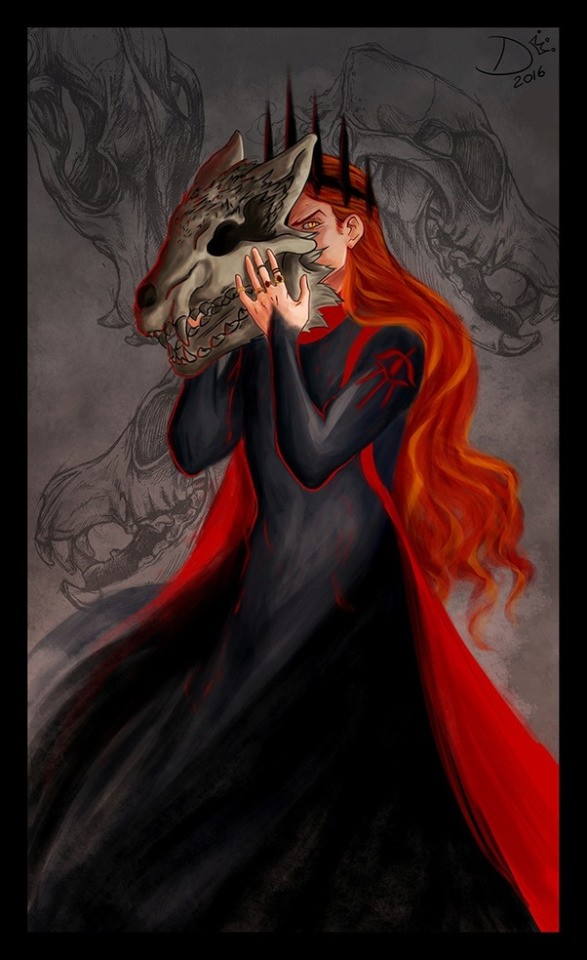
Lord of Werewolves by Dracontessa
After that, things only get worse. The Orcs spread across Beleriand, kidnapping Elves and desecrating all the land around Doriath. Morgoth sends out a bunch of spies to sow discord in every kingdom, hoping to win a psychological battle. Because of the Curse, most of the Noldor believe the sugary lies. The dirtiest trick that Morgoth pulls is setting free some of the Elves that he took captive, while keeping them under his control. This causes the Noldor to distrust even their own families.
With Men, Morgoth tries a different tactic. He attempts to turn them against the Elves by pointing out that the Men are inferior to Elves, and that the Noldor are inherently untrustworthy and untrusting. He promises the Men that if they come and join him, “the rightful Lord of Middle-earth,” then they’ll have honor and rewards and yada, yada. The Men don’t fall for this, which makes Morgoth even more spiteful towards them.
The Three Great Houses of Men are in complete disarray at this point. The house of Bëor —Barahir and his people — is basically destroyed, with the remainder barely surviving in the wilderness. The House of Hador are all stuck in Hithlum, and Hador himself is dead. The only remaining Men in the rest of Beleriand are the house of Haleth — the Haladin — who live in the Forest of Brethil. They’re one of the last lines of defense between Nargothrond and Morgoth’s onslaught. Hador’s grandsons, Húrin and Huor, are camped out in the Forest of Brethil with the Haladin. Halmir, the current leader of the Haladin, sends for backup, and a small army of Sindar Elves from Doriath come to help defend the forest. With the Elves’ help, the Men drive back the Orcs.
Húrin and Huor are some of our major players among the Men. They’re brothers, and they’re currently teenagers. Back before the battle, their father married Halmir’s daughter, so they’re members of the Haladin on their mom’s side. During the battle, they are separated from the rest of their company, but Ulmo protects them with a magical mist from the River Sirion, and then Thorondor rescues them when they wander near his mountains. Thorondor sends two eagles to pick them up, and the eagles bring them to Gondolin. Húrin and Huor become the first Men to ever see the secret Elven city of Gondolin.
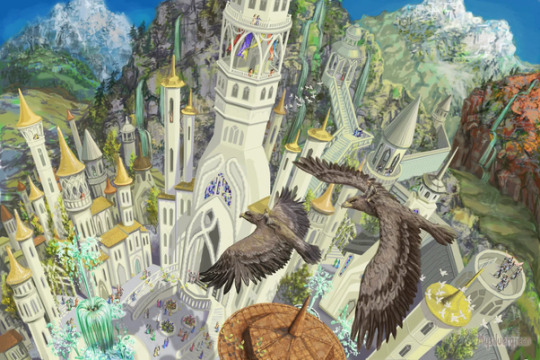
By Mysilvergreen
King Turgon receives them well. He’d gotten a prophetic dream from Ulmo, telling him he’ll need the Men’s help when things get bad, so he takes them in as his honored guests. Húrin and Huor live in the mystical Elven city for a year, and they learn a lot from Turgon in that time. Turgon wants to keep them in Gondolin, not just because of his proclaimation that no one can ever leave it, but also because he genuinely loves them. Eventually, though, they want to go home.
Remember how well that went the last time, with Aredhel?
Húrin reminds Turgon that Men don’t live very long, so he and his brother can’t just wait until things cool off, especially with their family thinking they’re dead. Also, they were carried into the city by eagles, so they have no idea where the entrance is and probably couldn’t find it again on their own. Turgon thinks that this is reasonable, and agrees to let them go, so long as Thorondor is willing to let them leave the way they came, by eagle-taxi.
But Maeglin — remember him? He’s the edgy Elf — Maeglin is happy that Húrin and Huor are leaving, because they’ve been soaking up all the king’s attention. Maeglin snidely tells Húrin that Turgon wasn’t so lenient in the past, like that time he threw Maeglin’s father off the walls.
To pacify Maeglin, Húrin and Huor swear an oath not to reveal anything about Gondolin. As you’ve probably gathered by now, oaths are serious business. I almost guarantee that this is going to bite them in the ass.
When Húrin and Huor return home, their family is overjoyed to see them, because they all thought that the brothers had died in the wilderness. Their father, Galdor, asks where they’ve been, and why they look like princes instead of like they’ve been living in the wilderness for a year. Húrin tells him that the only reason they were allowed to return at all was if they swore not to speak about it, so… don’t ask.
Meanwhile, King Turgon learns that the Siege of Angband is officially over, and Morgoth killed Fingolfin. Turgon doesn’t want to involve himself in the war, at least not yet — Gondolin is a secret safe haven for now, and he wants it to stay that way for as long as possible. It’s like the Wakanda of Elven cities.
However, Turgon also realizes that this is the beginning of the end for the Noldor, unless they can find some outside source of help. He sends secret bands of Gondolin Elves to sail to Valinor. That’s a truly desperate move, since the Noldor are exiles, and Valinor has wanted nothing to do with Middle-earth for centuries. Unfortunately, none of Turgon’s emissaries make it; the western sea has become much more dangerous ever since Valinor cut itself off. The sea is full of enchantments and illusions, and Valinor itself is hidden. There’s no way to get to it. With every failed mission, Gondolin’s doom inches closer and closer.
Guess who hears about it? Morgoth. Morgoth is very interested to know what happened to Finrod and Turgon, because Elven kings don’t just vanish off the face of the earth. He knows they must be somewhere, probably plotting a new scheme to take him down. He knows what Nargothrond is, but not where it is, and he knows nothing about Gondolin. In the Battle of Sudden Flame, he made the mistake of underestimating the strength of the Elves and Men. Although he won the battle, they managed to hit him back just as badly. He’s not about to make that mistake again.
Morgoth attacks Hithlum again. King Fingon is outnumbered, but rescued at the last minute by ships full of warriors sent by Círdan. The Elves win the battle, but King Galdor, Húrin and Huor’s father, dies in the same spot where his own father fell during the Battle of Sudden Flame. Húrin becomes the new patriarch of his house, and serves as Fingon’s thane. He marries Morwen Eledhwen, a woman of the house of Bëor, who fled the Forest under Nightshade for the Forest of Brethil alongside Queen Emeldir.
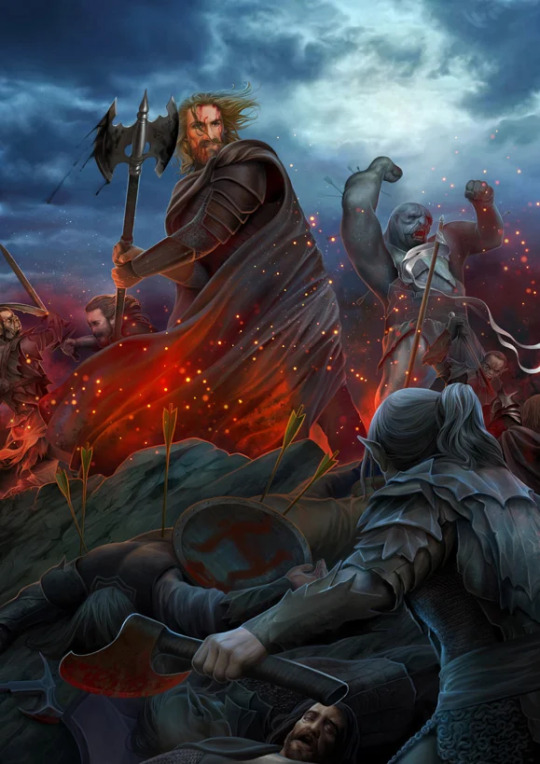
Húrin by Steamey
The House of Bëor is by this point reduced to only one man, Emeldir and Barahir’s son, Beren.
Chapter 19: Of Beren and Lúthien, Part One In which we hear the greatest love story ever told.
This is the first of what Tolkien called “The Great Tales,” some of the oldest stories in the Legendarium, all of which were ultimately unfinished. To put into perspective just what a big deal this story is, Tolkien and his wife Edith have the names “Beren” and “Lúthien” written on their respective headstones. The version here in the Silmarillion is the most complete, but it’s also an abridged version. This is how Tolkien introduces it:
Among the tales of sorrow and of ruin that come down to us from the darkness of those days there are yet some in which amid weeping there is joy and under the shadow of death light that endures. And of these histories most fair still in the ears of the Elves is the tale of Beren and Lúthien.
Most of my retelling here is paraphrased from the Silmarillion, but I’ve included some details that appear only in the Lay of Leithian, Tolkien’s unfinished poetic telling of the story. It’s really worth going and reading the Lay of Leithian; it’s extremely vivid and evocative, it perfectly imitates the medieval poetic form.
The story doesn’t actually start with Beren. It starts with an account of what happened to Barahir and his remaining men after they fled the Forest under Nightshade. They ended up camping out beside a lake called Tarn Aeluin, which is beautiful and reflects the stars. It was supposedly blessed by Queen Melian, and her magic repels the evil creatures that took over the rest of the forest. Barahir and co. are well hidden there, but Morgoth commands Sauron to find them.
One of Barahir’s people is a man named Gorlim, who has a wife, Eilinel. They love each other even despite the war, but when Gorlim returned home one day after a battle, he found his house empty and Eilinel gone. He still follows his people and hides out near the lake, but he holds out hope that maybe his wife isn’t dead. He periodically leaves the secret safe haven and returns to the empty house, hoping that his wife will be there. One time, he sees the lights on and hears her voice, but it’s a trap — Sauron found him. Sauron tortures Gorlim to force him to reveal the location of Barahir’s secret camp, but Gorlim holds out. That is, until Sauron tells him to name his price. Gorlim asks to see his wife again.
Then Sauron smiled, saying, “That is a small price for so great a treachery. So shall it surely be. Say on!”
Poor Gorlim reveals the location of Barahir’s camp. Then, with a mocking laugh, Sauron reveals that Eilinel is dead, and that he cast an illusion to ensnare him. “Oh, but don’t worry, I’ll still send you to her,” he says, and then kills him. They don’t call him Gorthaur the Cruel for nothing.
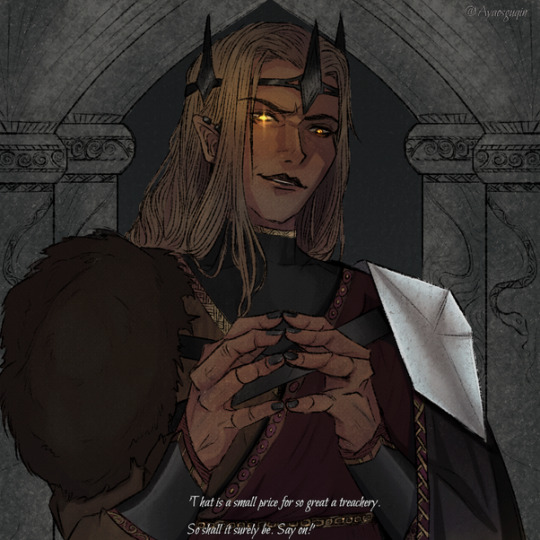
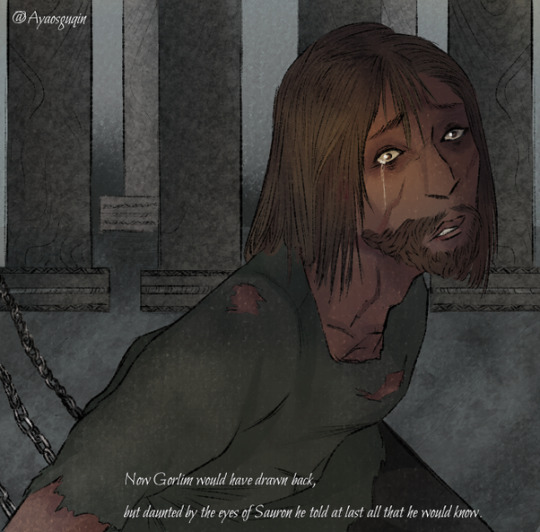
By @ayaosguqin
See, this is one of the things that makes Sauron different from Morgoth. Morgoth is spiteful and enjoys sewing discord and causing destruction for the sake of it, but we haven’t seen this kind of calculated sadism from him yet. (There’s not much that’s subtle about busting in with a giant spider and killing trees.) Sauron, having been a Maia of Aulë, has an appreciation for subtlety and craftsmanship. Sauron likes to stick the knife in and twist it. And as The Lord of the Rings makes clear, he’s a master of psychological warfare.
Now that Sauron knows where the secret camp is, his forces attack the men at Tarn Aeluin. They massacre everyone, save Beren. Beren is out on a spy mission when the Orcs attack, and he has a dream in which Gorlim’s ghost appears to him to tell him what happened. Beren rides back, but it’s already too late. He finds his father and everyone else dead.
Beren builds a cairn for his father and swears vengeance. He hunts down all the Orcs, slaughtering them by himself. He sneaks near their camp, where they’re gloating and holding up his father’s hand as a trophy. On the severed hand is a ring, the ring that Finrod Felagund gave to Barahir. Beren swoops in, steals the hand with the ring, and runs off before the Orcs have a chance to react.
Beren lives by himself in the wilderness for some time. He befriends the animals, and becomes a vegetarian as a result. He manages to perform many heroic deeds just in that time, so that he becomes famous. He’s already such a legend that Morgoth puts a price on his head, just as high as that of King Fingon himself, but the Orcs are so afraid of Beren that they avoid him instead of hunting him. Morgoth resolves to send an entire army after Beren, and not just any army — an army of werewolves, captained by Sauron himself.
The werewolves are enough to chase Beren away from the land where he buried his father. He heads south, towards Doriath. He resolves to pass through Queen Melian’s magic wall, for some reason. (Maybe because it’s the only guaranteed safe place?) He travels along sheer mountain cliffs, and through the spider-infested wastes that had been twisted by a combination of Sauron’s magic and Melian’s magic. That land was basically the Mordor of its day, and no one knows how Beren got through it; whatever he experienced there was terrifying enough that he never spoke of it again. When he arrives at the magic wall, he passes right through like it isn’t even there. This event had been predicted by Melian herself: ‘because the power of that Man’s destiny will overcome her own. People will sing about that event until the distant future, when Middle-earth is unrecognizable.’
He finds himself in the north of Doriath, a forest called Neldoreth. He’s exhausted and harrowed, having spent years traveling through a cursed land. But everything in Neldoreth is beautiful, it’s summertime, and Beren sees a beautiful Elf maiden dancing on the grass. It’s Lúthien, the daughter of King Thingol and Queen Melian themselves. Lúthien is the most beautiful person alive. (Like, metaphysically.) Being the child of a Maia, she is more or less a demigoddess.
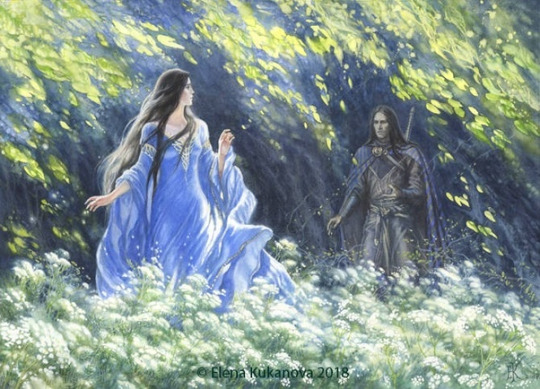
Encounter of Beren and Lúthien by Elena Kukanova
Beren is instantly smitten. In fact, he’s literally enchanted by her — just watching her casts a spell on him. When she suddenly vanishes, he literally can’t speak. He wanders the woods like an animal, searching for her. He doesn’t know her name, so he calls her Tinúviel, which means “Nightingale” in Sindarin. A whole year passes, and he sees her in the beauty of nature around him, like she’s a ghost and he’s fondly recalling her memory. A whole winter later, she reappears, and sings a song so beautiful that it brings spring back to the woods:
Keen, heart-piercing was her song as the song of the lark that rises from the gates of night and pours its voice among the dying stars, seeing the sun behind the walls of the world; and the song of Lúthien released the bonds of winter, and the frozen waters spoke, and flowers sprang from the cold earth where her feet had passed.
When he hears her song, Beren can suddenly speak again. He calls out to her, using the name “Tinúviel.” Luckily for him, Lúthien falls just as in love with him upon seeing him. The narrator says that “doom fell upon her” as soon as she loved him back, which could mean either that she met her destiny or that she is going to die for her love. Probably both.
Beren goes to embrace her, but she vanishes again as soon as day breaks. Beren immediately feels a mixture of ecstasy and anguish. He falls into a coma, and has nightmares about groping through the dark to find the
vanished light. (I’m starting to note parallels between Lúthien and the Two Trees, and also the Silmarils.) But Beren’s anguish is nothing to Lúthien’s. Now that she’s fallen in love with a mortal, her fate is inextricably intertwined with his. She’s no longer free.
Lúthien returns to Beren and wakes him from his coma. They walk through the woods together, blissfully in love, throughout that spring and summer. Presumably they talk and actually get to know each other in that time.
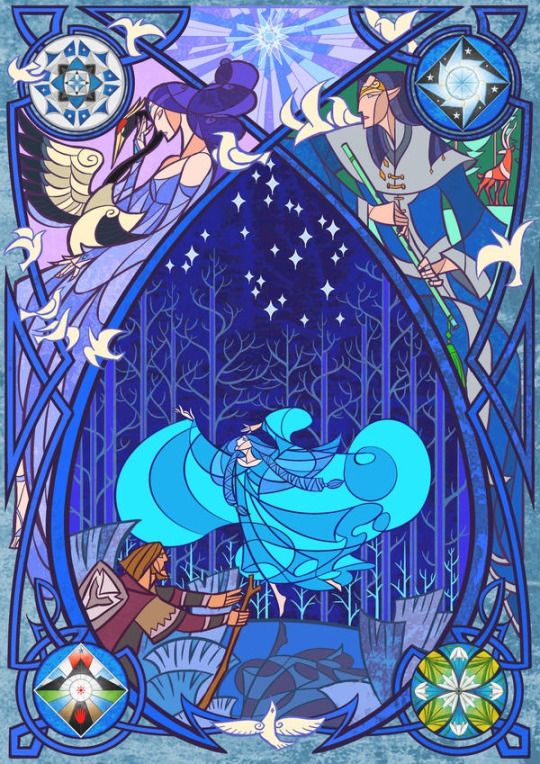
A sudden in love by breath-art and aglargon
There’s another person who loves Lúthien, an Elven bard named Daeron. He spies on Beren and Lúthien in the woods. Jealous that Lúthien loves Beren instead of him, he goes and tattles to Thingol about their relationship. (In the Lay of Leithian, Daeron — in his envy — is able to cast a spell of silence upon Beleriand, so that there is no music or even birdsong.) Thingol is immediately furious, because he’s extremely overprotective of his daughter, and he hates Men. He confronts Lúthien about her new boyfriend, but she refuses to say anything until Thingol promises that he won’t hurt or imprison Beren. Lúthien personally leads him before her father’s throne.
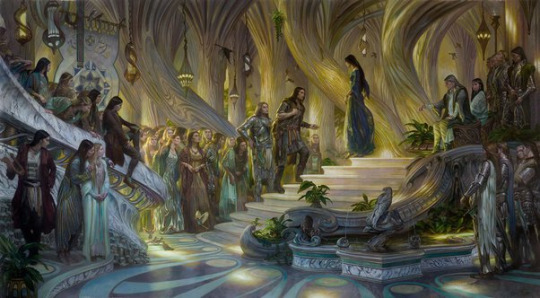
Beren and Luthien in the Court of Thingol by Donato Giancola
Thingol demands to know who Beren is, but he’s so intimidating that Beren is stunned into silence. Lúthien answers for him. Thingol tells Lúthien to back off and let Beren speak for himself. What’s Beren’s excuse for entering the forbidden realm of Doriath? Beren’s response is very poetic and eloquent, but basically boils down to “I want to fuck your daughter.”
There’s pin-drop silence in the hall as the assembled Elves wait for Thingol to smite Beren. Thingol immediately regrets his promise not to harm him. Thingol’s response is to fold his hands, smile coldly, and say,
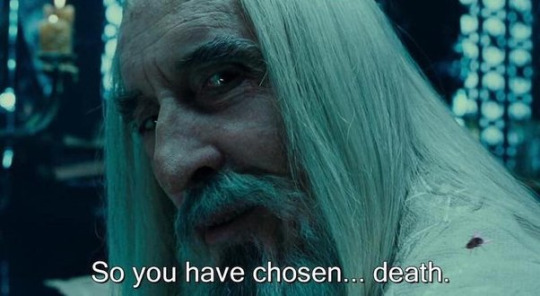
(I mean, it’s not these exact words, but it’s close enough.)
Thingol accuses Beren of being a spy and a thrall of Morgoth, at which Beren takes offense. Beren isn’t afraid of death, but he won’t allow himself to be insulted by any Elf, even a king. His father was a lord of Men and he deserves to be treated like a prince! He has a ring given to his father by Finrod himself, for Eru’s sake! He holds up the ring, and all the Elves see it. This is the Ring of Barahir, which will eventually get passed down to Aragorn. The jewels set in it were originally cut by the Noldor in Valinor itself.
Melian whispers to her husband that he won’t be the one to kill Beren. Beren has a lot more stuff he’s destined to do, but his destiny is still intertwined with Thingol’s. Whatever Thingol does next will seal his own fate, too. Thingol proceeds to choose the stupidest thing possible.
Beren wants to marry the Faerie King’s daughter. So, as is common in fairy tales, Thingol sets him an impossible task that he must complete to earn Lúthien’s hand: He must steal a Silmaril from the crown of Morgoth. Thingol feels like this the nearest thing to a fair price for his daughter. Of course, like most mythological kings, he’s hoping that Beren will die in the attempt.
You can just hear Melian’s facepalm through the page.
As is hopefully clear by now, the Silmarils are like a bomb waiting to go off. Everything about them is fraught — from the fact that they contain the last light of the Trees, to Morgoth’s obsession with them, to the Curse laid on all Fëanor’s sons for their unbreakable oath to get them back, etc. etc. Thingol’s choice to get involved in that shitshow was a dumb fucking idea. It’s not really his place to say or do anything concerning the Silmarils, and he effectively dooms his own kingdom by involving himself with them. In fact, by doing so, Thingol subjects himself to the same Curse that affects all the Noldor — you know, the reason he banished them from his kingdom and banned their language in the first place.
But that’s getting ahead of ourselves. Let’s get back to Beren, who responds to this by literally laughing it off and calling it easy:
“For little price,” he said, “do Elven-kings sell their daughters: for gems, and things made by craft. But if this be your will, Thingol, then I will perform it. And when we meet again my hand shall hold a Silmaril from the Iron Crown; for you have not looked the last on Beren son of Barahir.”
I like the parallelism here: Both Beren and Sauron call something that’s extraordinarily valuable to someone else a “little price” or “small price.” Obviously, we’re supposed to side with Beren in this instance, but I wonder if his pride will be his fall.
Having received his main quest, Beren leaves Menegroth.
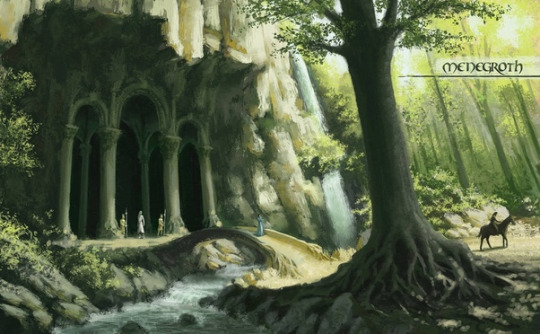
Menegroth by David Gresit
Melian tells Thingol what an idiot he is for involving himself in the Main Plot and forsaking his kingdom’s safety in isolation. She can’t protect him from whatever happens next. Thingol is pretty confident that Beren’s going to die, which proves that he’s not Genre Savvy enough to make good decisions from here on out. He should really listen to his wife.
Lúthien doesn’t quite enter “but Daddy, I love him!” territory, but she does stop singing. All of Doriath is eerily silent.
Beren travels west, towards the River Sirion, and then to Nargothrond. Being alone and with no resources, he doesn’t have any other option but to go to Finrod for help. He wisely holds up the Ring of Barahir as he enters Finrod’s territory, because it was originally Finrod’s ring, and his Elf snipers would know not to shoot. Knowing that he was being watched by an army’s worth of hidden Elves, he randomly yells out “I am Beren son of Barahir! Take me to your King!” in the middle of a field in the hopes that someone will hear him and decide not to kill him. After doing this several times, he’s apprehended by the archers and taken to Finrod.
Finrod receives Beren warmly. Privately, Beren tells Finrod about his father’s death and about meeting Lúthien. He cries more over remembering Lúthien than remembering his father. Remember, Finrod promised to help Barahir or any member of his family in need, because they had saved him. So, he has no choice but to help Beren retrieve a Silmaril, even though he knows it will not go well.
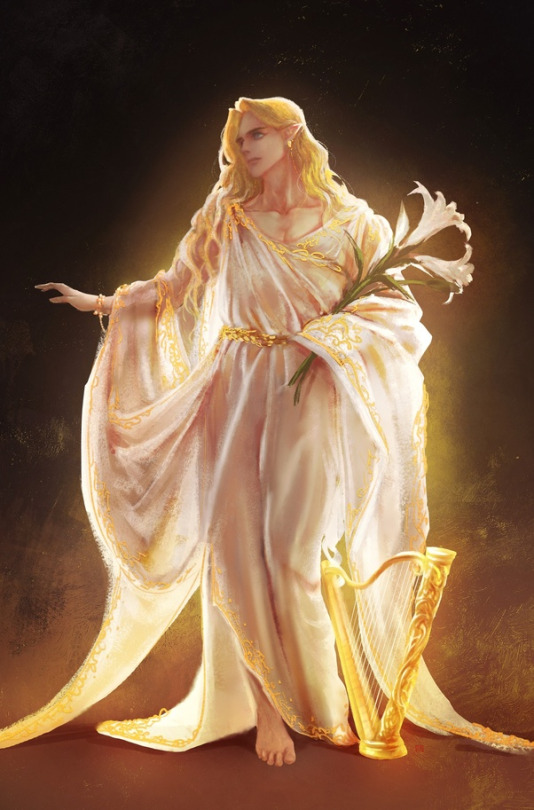
Finrod by yidanyuan
He tells Beren, ‘Well, it’s obvious that Thingol wants you dead, but if anyone so much as mentions the Silmarils, the sons of Fëanor are on them like a pack of wolves. Celegorm and Curufin are powerful lords in my court, and I can’t risk antagonizing them. If they find out you want a Silmaril, they’ll kill you. But I made a promise to your father, so I have to help you. In short, we’re all screwed.’
For some reason, Finrod decides that the best thing to do is to be as transparent as possible. So, he summons his court and stands before his people. He tells them all about the promise he made to Barahir, and how he is therefore obligated to help Beren. He asks his lords for help. Celegorm’s response is predictable. He repeats the Oath of Fëanor, reaffirming that the sons of Fëanor will hunt down anything alive that dares to seek a Silmaril. He goes on a tirade as impassioned as the one that Fëanor originally gave to the Noldor back in Valinor. (Like father, like son, I guess.) Then Curufin speaks, more quietly. What he says boils down to: ‘Nice kingdom you’ve got here, Finrod. Would really be a shame if something happened to it.’
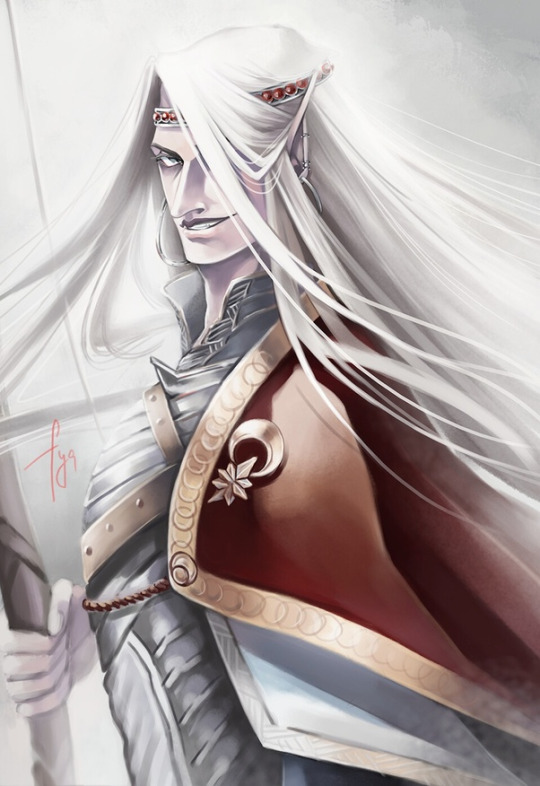
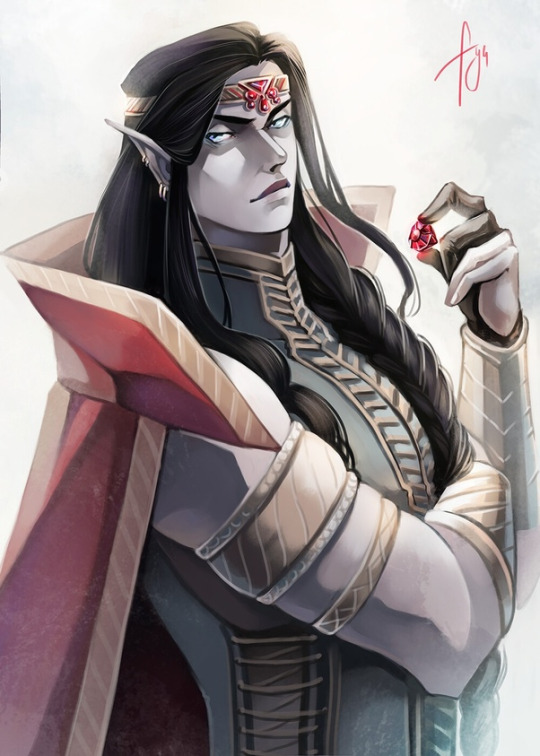
Celegorm and Curufin, by Julia Reizen
Curufin’s speech scares the Elves of Nargothrond so much that they avoid open war for decades, preferring guerilla warfare with arrows, poisoned darts, and magic. According to Tolkien, this is less valorous than open combat, and diminishes their whole society.
Say what you will about Fëanor and his brood, they’re damn good at public speaking.
The Elves of Nargothrond begin to murmur amongst themselves that Finrod can’t tell them what to do as though he’s a Vala (even though he’s… y’know… the king), and all of them refuse to help him. The Curse is in full effect: Celegorm and Curufin realize that this is a golden opportunity to send Finrod alone to his death, and take over Nargothrond for themselves.
Finrod reads the room. He takes off his crown, and throws it at his feet, renouncing his rulership of the kingdom that he built. He looks directly at Celegorm and Curufin and tells them that while they may be faithless bastards who will break their oath of loyalty to him, he will not break his own promise to Barahir. He addresses the rest of the room — there’s got to be at least a few people who haven’t been affected by the Curse, and who will follow him, so that he isn’t pathetically driven out of his own kingdom. Right? A grand total of ten people stand up for him. One of them, Edrahil, picks up Finrod’s crown, and says that it should be given to a steward instead of being left for Celegorm and Curufin to snatch. Whatever happens, he says, Finrod is still the true king of Nargothrond. #IStandWithFinrod.
Finrod chooses Orodreth, his nephew (or youngest brother; sources differ), as his steward. Celegorm and Curufin just smile and withdraw from the room, which isn’t creepy at all.
Finrod and Beren leave Nargothrond with their ten loyalists. They travel north, come upon a band of Orcs, and kill them all. Finrod uses a magical illusion to disguise his company as Orcs, and they sneak through the mountain pass towards Angband. Sauron finds them anyway, and intercepts them. Sauron and Finrod engage in — of all things — a singing competition. It’s very similar in principle to “the oldest game” from Neil Gaiman’s The Sandman, in that it’s a battle between dueling concepts that are instantaneously manifested as the singers describe them. Sauron sings about treachery, betrayal, uncovering secrets, piercing through things, and sorcery. Finrod answers with a song about resistance against evil, keeping secrets, maintaining trust, standing strong, and gaining freedom.

Finrod and Sauron by rami-fon-verg
There is something simple, almost childish, about this back-and-forth. I feel like I’ve seen several different children’s shows in which a good character and an evil character sing at each other instead of fighting, with the evil character extoling the virtues of power and the good character singing about the importance of love. (The one that comes to mind is Barbie and the Diamond Castle, in which the two heroines and the villain play good/evil music at each other, and the good music overpowers the evil music, resulting in the villain’s defeat.) I wouldn’t be surprised if several anime have a scene like this, as well. And yet, it is primordially powerful, like Gaiman’s “oldest game.” In Tolkien’s universe, singing was what created the world in the first place, and singing is therefore a direct and powerful means of manifestation.
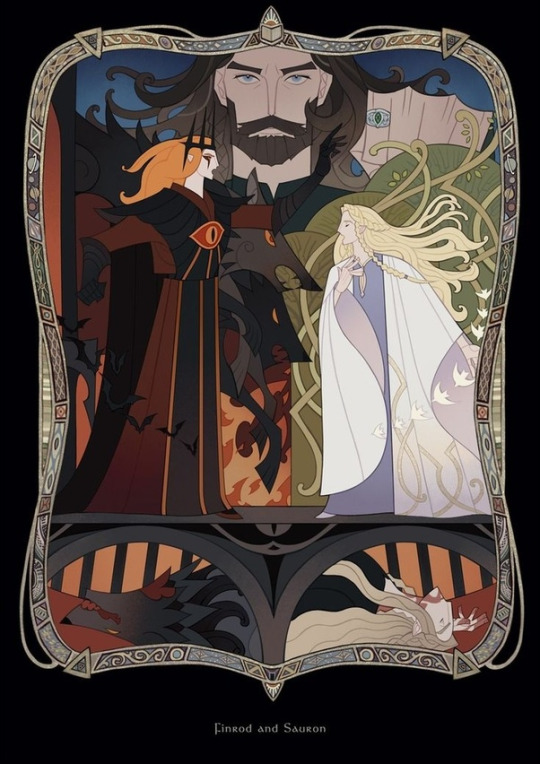
By Wavesheep
Unfortunately, it does not end the way it would if this were a Barbie movie or an anime. Finrod is a great singer, but Sauron is better — he is a Maia, one of the Ainur, meaning he was there when the original Music of creation was sung. It’s impressive that Finrod manages to hold out as long as he does, but in the end — much like Fingolfin and Fëanor before him — he loses.
To tell this part of the story, Tolkien randomly switches to verse; he quotes a section from the Lay of Leithian. Medieval texts actually do this; lots of them will randomly switch between prose and verse. Texts that do this are called “prosimetric.” For example, in the Volsung Saga (which reads very much like The Silmarillion), when Sigurd meets Brynhild, the text abruptly switches into verse as she lists all the different types of runes and their uses. There’s several other instances in that text when it randomly switches between prose and verse. It prefaces the verse parts with something like, “So saith the song of Sigurd,” referencing poetic versions of the same story that otherwise don’t survive. Tolkien evokes that same structure here, right down to saying “as it is told in the Lay of Leithian.”
The Lord of the Rings is prosimetric, too, but most of the songs are diegetic, meaning they’re actually being sung by characters in-universe. That’s not what’s going on here. The verse part describes the singing contest between Sauron and Finrod, it’s not the actual songs that they’re singing. But it’s really clever of Tolkien to switch to verse to describe this scene, because it sets the vibe! It’s like you’re listening to a distant echo of their songs, passed down through generations of oral storytelling. It wouldn’t be nearly as evocative if he just described the scene flatly in prose.
Thank you for indulging me in that tangent! Moving on: Sauron throws Finrod and co. into a dark pit, and threatens to kill them if they don’t tell them who they are and why they’re there. Periodically, he sends a werewolf to eat one of them (which, I’ll bet you anything, is a direct reference to the Volsung Saga). Still, none of them talk.
Meanwhile, back in Doriath, Lúthien intuitively senses that something is wrong, and asks her mother what has happened to Beren. Melian tells her that Beren is in Sauron’s dungeon. Lúthien resolves to go and rescue him by herself. She goes to ask Daeron for his help, but Daeron refuses to risk his own neck for Beren’s sake. He’s been afflicted with full-on incel syndrome, so out of spite, he snitches to Thingol a second time. (Thingol is so grateful that Daeron keeps tabs on his daughter for him, that he names Daeron a prince. Make of that what you will.) Thingol can’t imagine anything worse than letting his daughter waste away in a dark pit, so he builds a house in a giant beech tree, called Hírilorn. Because the best way to keep your daughter safe from one prison is to put her in another! Logic!
Well, it’s a common trope in myths and fairy tales: The king is overprotective of his daughter and puts her in a tower, or a box with a hole in the roof, or some such. Lúthien, however, is proactive. She doesn’t wait for someone to rescue her from her treehouse. Instead, she tricks her guards and Daeron into sending her a golden bowl of wine, a silver bowl of water, a spinning wheel, and a loom. Then she sings a spell that mentions all the tallest and longest things in the world, which causes her hair to grow extremely long. She mixes the wine with the water, then sings a song of day over the golden bowl, and a song of night over the silver bowl. Finally, she sings a song of sleep. The singing enchants her hair, filling it with corresponding ideas that shape the way Lúthien wants it to behave. (Similar to Sauron and Finrod’s magic songs, singing about an idea causes it to manifest.) She weaves a robe out of her hair, a robe that’s described as being misty and shadowy, like it’s woven from clouds at night. Lúthien weaves a rope out of what’s leftover, and puts a sleeping spell on it. Then she just throws it down onto the guards at the foot of the tree, and they go to sleep, allowing her to climb down the rope and escape.
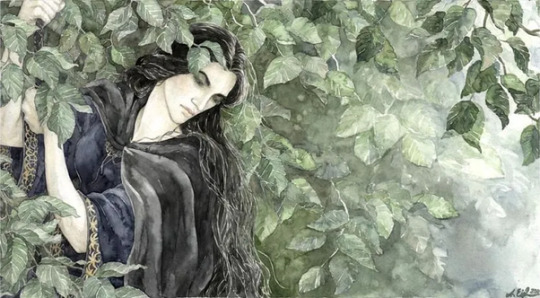
Lúthien prepares her escape from Hírilorn by Anke Katrin Eißmann
As she leaves Doriath, she comes upon Celegorm and Curufin, of all people. They’re out hunting, hoping to learn something about what happened to Finrod (and probably plotting behind his back the whole time). Among their hunting dogs is a particularly large wolfhound called Huan, who actually came with them from Valinor. Oromë himself, the Vala of the hunt, gave the dog to Celegorm long ago. Huan loyally followed Celegorm into exile, and therefore became automatically subject to the Curse. He’s foretold to die, but only after he faces the biggest and baddest of big bad wolves.
Spoiler alert, the dog’s gonna die!
Huan finds Lúthien, because he’s immune to her enchantments, and brings her to Celegorm. Once she learns that Celegorm and Curufin are enemies of Morgoth, Lúthien decides that she trusts them, and reveals herself to them. Celegorm (or, in the Lay, Curufin) instantly falls in love with her, because… of course he does. He offers to help Lúthien, making a point not to say that he already knows about the quest. Lúthien goes with them to Nargothrond.
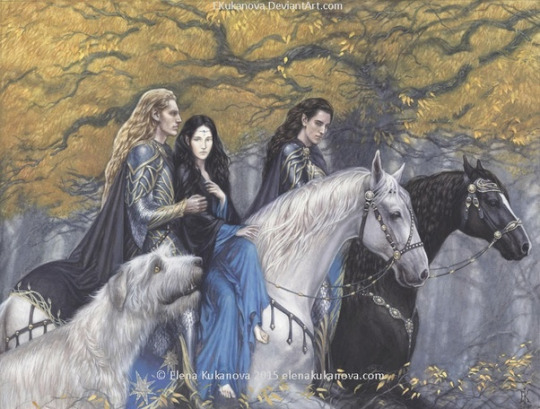
Celegorm and Curufin find Lúthien by Elena Kukanova
As soon as they get there, Celegorm and Curufin show their true colors. They imprison Lúthien, take away her magic cloak, and forbid her to speak to anyone else but them. Lúthien escaped one trap, and fell right into another. Now that the brothers know from Lúthien that Finrod and Beren are in Sauron’s prison, they figure that it’s easiest to just let them die. Nargothrond is as good as theirs. And now that they have Lúthien, they have leverage over Thingol — they can force him to give Lúthien’s hand in marriage to Celegorm. That would make Celegorm and Curufin the most powerful princes of the Noldor! [Insert evil laugh here.]
Huan, however, is the Goodest Boy and is too pure-hearted to follow Celegorm (even though Celegorm is his beloved master whom he’s been serving for literally centuries). Huan also fell in love with Lúthien upon seeing her for the first time, but in a decidedly less creepy way. He comes to her prison every night to keep her company, and Lúthien tells him all about Beren.
Huan decides to help Lúthien break out. He brings her magic cloak to her, and speaks to her (he’s only allowed to talk three times before he dies). He shows her a secret passage out of Nargothrond, and they escape together. Huan even swallows his pride enough to allow Lúthien to ride on his back.
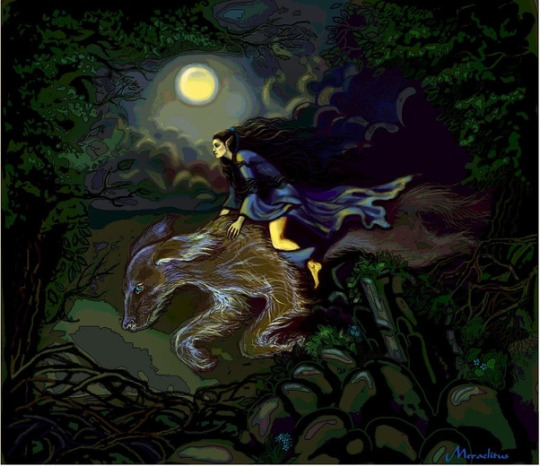
Lúthien riding on Huan by Meraclitus
I mean, if you’re gonna be a damsel in distress, a dog is a pretty awesome thing to be rescued by.
(Stopping there, because I'm running up against the max number of images. More to come!)
#the silmarillion#the silm#silmarillion#silm art#the silm art#the silm fandom#silm fandom#beren and luthien#fingolfin#morgoth#beren#luthein#luthien#finrod felagund#celegorm#curufin#thingol#melian#sauron#tolkien#jrr tolkien#j.r.r. tolkien#middle earth#long post
82 notes
·
View notes
Text
i have been crying about this for days. the arabic language is so beautiful. i am both thankful to this artist for sharing this gorgeous song with us, and torn to pieces thinking about how much pain she must be in watching her home get destroyed and her people suffer.
she mentions sending peace on an olive branch. edit: "olive" means zaytun (زيتون) watch out for this word if you read/see/hear Palestinian art, the cultural context will help you understand the message more. besides the olive branch being a well known symbol for peace (it's even on the United States dollar AND the United States Seal) there is a rich historical and cultural context behind this lyric. for those who don't know, Palestine has been known for its olive trees for millennia. some of the oldest living olive trees in the entire world are in Palestine (although i really don't know if they are still standing at this moment). olives are well-loved and crucial to Palestinian cuisine, as well as being a major source of income, since many Palestinians are olive farmers and have been for generations. a symbol for peace, harmony, friendship, resilience, and perserverance, the olive tree represents Palestinian spirit, and olive leaf patterns are also featured on the Palestinian keffiyeh.
there is another lyric where she says "in the land of peace, peace is dead." one english transliteration of this arabic phrase is "fi 'ard alsalam mat alsalam" with 'ard (أرض) meaning land/earth, al-salam or more commonly salam (سلام) meaning peace, and mat (مات) being a conjugation from the word mawt (موت) meaning death. (I'm not sure in which tense, arabic has so many tenses and I don't want to spread misinformation, my knowledge of the arabic language is like 1st grade level and mostly from osmosis due to growing up Muslim and having early exposure to the language through the Quran and basic classes at Islamic school, and I'm not even a practicing Muslim anymore, so pls feel free to correct my mistakes) lyrically, it was this phrase that stuck out to me the most, because of the emphasis placed on "peace" through its repetition. in the land of peace, peace is dead; Palestine is The Holy Land in Islam, Judaism, and Christianity. peace was the foundation of the land, not just peace meaning lack of war but peace as in spiritual peace, the kind of peace that fills your heart with love for this world and the people in it. now that this peace is being actively destroyed, Palestine is losing itself. Elyanna (the singer) is saying that her home is being gutted from the inside out, until it's unrecognizable, until it lacks the one thing that MADE Palestine; peace. It is heartbreaking.
The reason I am sharing this song and breaking down this lyric is because I want to re-humanize the Arabic language and Arab culture. It has been demonized for far too long, and it was/is on PURPOSE. IDF soldiers bombing Al-Shifa hospital and claiming (lying) that they found a list of Hamas guards and hostages (that were never in the hospital) when it was a CALENDAR and the only names of "Hamas guards" listed were fucking Sunday, Monday, Tuesday, Wednesday, Thursday, Friday, and Saturday, is exactly what I mean when I say that the world has been so successfully brainwashed against MENA (the Middle East and North Africa) that even the Arabic language itself, written or spoken, is perceived as inherently violent and threatening.
I hope this post has contributed in helping you unlearn the racism and anti-Arab/anti-Middle Eastern propoganda you have been taught.
From the river to the sea, Palestine 🇵🇸 will be free.
🍉🍉🍉🍉🍉🍉🍉🍉🍉🍉
#palestine#free palestine#free gaza#from the river to the sea palestine will be free#i stand with palestine 🇵🇸#arabic music#arabic art#respect the arabic language and the culture of those who speak it#they are not barbarians they are people#they are beautiful people who make beautiful art#afrodite speaks
135 notes
·
View notes
Text
Dandelion's fame is said to span from the buina river to the yaruga. After cross referencing multiple maps to figure out what kingdoms his name is most known in, I can now safely say that the consistent ones shown between these two rivers are: Redania, Kaedwen, Aedirn, and Temeria, with the big notable areas in those kingdoms being Lyria, Cidaris, Vergen, Brugge, Novigrad and Ard Carraigh
Directly below the yaruga river are Cintra and Angren, so at a push you could say anyone who lives near the river's borders of those kingdoms might have heard of him too, but canon wise his reach is basically everything above Cintra which is a huge fucking area. I think the only places his reach is exempt from in the far north are Kovir and Poviss
But yeah there you go. A fun neat little lore fact for you that took up about two hours of my time because I was tracking down and reading about a dozen different goddamn maps made for this series, including the ones in the games and a few done by fans. My eyes hurt from it all
#the witcher books#lore post#much like geralt I have a habit of forgetting just how big of a celebrity he is#truly the abba of his time
8 notes
·
View notes
Text
Lord of the Lost - The electric plug of the iron maiden
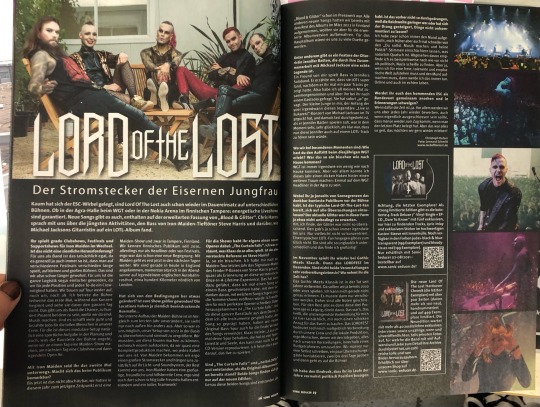
So yesterday I stumbled across this interview with Chris in the new Sonic Seducer magazine. It was pretty short and didn't exactly give us the most specactular news, but as always, Chris had some nice things to say (such as about the bass track on 'The Curtain Falls', speaking up politically or participating at ESC again (ARD, I'm staring at you very intensely, you know what to do!)). And since I was on a short train ride anyway, I used the time to type down some translation for you all. Enjoy!
Lord of the Lost
The electric plug of the iron maiden*
(* the article purposefully doesn't use the band name 'Iron Maiden' here, but the literal German translation 'Eiserne Jungfrau', probably because the journalist thinks they're funny)
Christoph Kutzer
The very moment that the ESC-hype has cooled down, Lord of the Lost are back to continuous operation on various stages. Whether it's at the Agra hall of the WGT or in the Nokia Arena of Finnish Tampere: Energetic live shows are guaranteed. Then there are also the new songs on the extended edition of 'Blood and Glitter'. Chris Harms talked to us about the most recent events, the bass of Iron Maiden's subwoofer Steve Harris and about how Michael Jackson's guitarist found her way to a LOTL record.
Question: Right now, you are constantly alternating between playing club shows, festivals and support shows for Iron Maiden. Isn't that quite a challenge?
Chris: For us as a band it doesn't really matter where we're playing. It's very common to play at different festivals for a varying amount of stage time, on smaller and bigger stages. So we're used to that for a while now. Actually, all the logistics have become easier for us, since we now have an own crew member for every position and every thing that needs to be done. We [as a band] do not have to set up the stage nor do we need to take it down. Sometimes, the moment that the concert begins is the first time that I enter the stage, which I haven't even seen all day long. This way, we as a band get the chance to fully concentrate on doing what we're actually there for: making music. Plus, it offers many well-payed jobs for all the lovely people of our crew. For them of course, this modular setup is a challenge, with all the planning that needs to be done and the stage itself as a construction site, when you play a Maiden show one day, a club show the other, and then on the third day some open air concert.
Question: You are now touring with Iron Maiden for the second time. Have you noticed any differences in the audience?
Chris: That's hard to tell at this point, because as of now we only had one proper Maiden show this year, which took place in Tampere, Finland. We did know the Finnish audience since 2010, but only from festivals or performing as headliners, so it was definitely a different experience. But we'll continue our journey with Maiden in the next days. Just today, we have arrived in England, right now I'm enjoying the evening sun on some English highway rest stop, roughly hundred kilometres north of London.
Question: Did something change for you concerning the requirements? Did your show get bigger? The venues do have impressive sizes …
Chris: Well, the internal setup of Maiden's stage is the same as last year, it might just look different to the outside. This is why we could keep the foundation of our 2022 setup, while implementing some reasonable expansions. To make this tour, we had to ramp up quite a bit, because we practically have to offer a complete production where every single plug is our own. Maiden just gives us one big power plug, and they attach us to their light and sound system, but the rest is ours. Iron Maiden have a great, kind and helpful crew, we made some beautiful friendships there, and it's always an amazing teamwork.
Question: For the shows, you have brought a new opener, 'The Curtain Falls'. I was impressed by everything Klaas is playing there. Is that some hidden reference to Steve Harris?
Chris: Well, it actually is to some degree. After the Maiden tour of last year, I bought myself Steve Harris's signature model of the Fender P-Bass, kind of as a memory to this alleged once-in-a-lifetime experience. So this led to me writing one song on this exact bass, imagining the kind of song that I would like to open the summer shows with. I wanted to write something that, in my eyes, would be the perfect opener. That's how 'The Curtain Falls' came to be. And since all these bass lines from the demo in which I played every instrument on my own have shaped the song so much, we actually kept my original bass track for the final version of the song. Klaas said: 'Let's keep your track, it has so much spontaneity and soul, you cannot reproduce that for the album version. But I'm looking forward to playing that live.'
Question: Were 'The Curtain Falls' and 'noituLOVEr' only produced after the original record was completed? Since both songs are just on the newest edition.
Chris: Exactly, both songs were written when 'Blood & Glitter' had already been in press. All the other new songs were actually recorded together with the rest of the album in Finland, March 2022, but we wanted to keep them for the extended version. It would have been too many duets for the main record.
Question: One of those features has the guitarist Jennifer Batten, who has become quite a legend with her collaboration with Michael Jackson.
Chris: A friend of mine is playing the bass in Jennifer's solo band. He told me that she really enjoyed LOTL when he showed her some tracks that one time. So I gathered all my courage and asked him to ask her for a guest solo. She said 'yes' immediately. The little boy in me who had watched this legendary 'Live in Bukarest' concert of Michael Jackson on tv back then in the 90s, and who totally lost it seeing Jennifer Batten play, was very very happy once we found out that Jennifer would actually be part of a LOTL track.
Question: Since we're already at special moments: How did you experience your performance this year at WGT? Was that a little bit like coming home?
Chris: In a way, WGT is always like coming home. But this year I could finally put this really big checkmark behind another dream: For one time, being the headliner at WGT at the Agra hall.
Question: But apart from scene borders, you actually have one of the most colourful audiences you could imagine in front of a stage. Is the typical Lord of the Lost fan willing to face all these new surprises? Like the glitter currently, which might not have been that expected?
Chris: Hm. I think the glitter was actually not that surprising at all. It has always been a part of us. Maybe not to this extent or this concentrated. Also, luckily there is no typical Lord of the Lost fan. All of them are so unbelievably diverse, and I think that's fantastic!
Question: In November, you will play at Gothic Meets Klassik again. Then there is the LORDFEST in December. I would imagine both events to be very preparation-heavy. Where do you get all that time from?
Chris: Well, the Gothic Meets Klassik event has been prepared for years. We were supposed to play there in 2020 or 2021, I cannot properly recall, but then it had to be postponed. So all the notes have already been written. For everything else, we do have three rehearsal days in Leipzig, right before the show. That's it. Which means that the hardest part of the preparation for me right now is to actually buy a nice suit. For the LORDFEST, most of the preparation is done by our crew and the local production, so it's all in the hands of other people who'll get the instruction from us to arrange everything as we want it to be, and within a certain given budget. The only thing we need to do is come up with a setlist, get in touch with some surprise guests, then rehearse for two or three days, and then we can already get on stage.
Question: I feel like over the years you have taken a more and more political stance. Was that just not this visible before when you hadn't yet been this much in the spotlight or was there a growing need not to leave certain things uncommented?
Chris: I have always been someone who wouldn't keep quiet about these things, but back then I was quicker to get intimidated by those people who tell you to 'make music and not politics', which is utter bullshit of course. Apart from that, I gotta say that I still don't see it as political to think that Nazis are shit. But yeah, when I have to stand up and fight for a freer, more tolerant and sympathetic world, then I will always do that. Online and in real life.
Question: Will you be watching the upcoming ESC together as a band event and revel in your memories?
Chris: If we do find the time, we will do that. But even more importantly, we will apply again every single year. Even when it's practically a given that we won't be allowed to participate again after having come last once. But the experience was so awesome, we need to have that again!
27 notes
·
View notes
Text
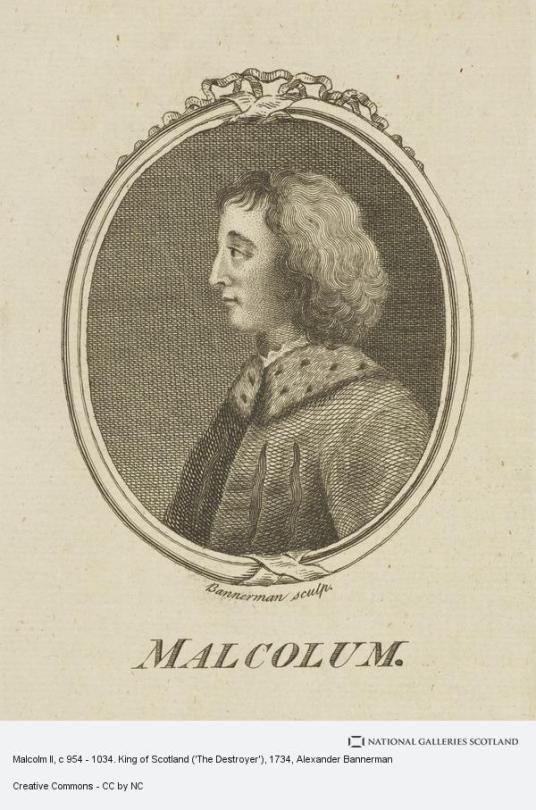
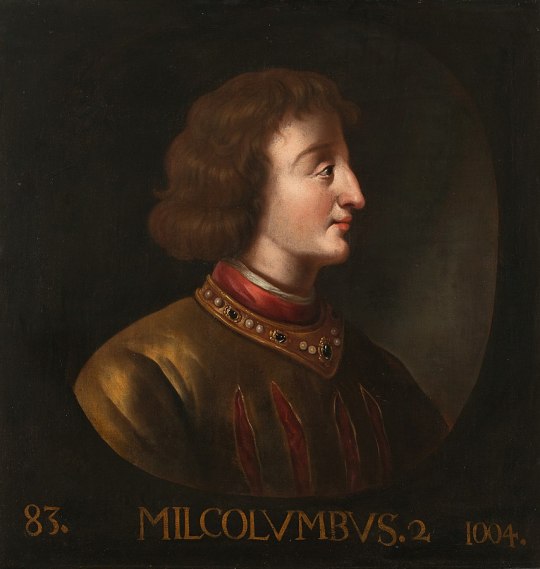
November 25th 1034 saw the death of Malcolm II at Glamis.
There's a lot to take in here, and a lot of supposition, it gets like that when you're delving into the history almost a thousand years ago.
Malcolm had been King since 1005, at this time Scotland was far from the nation we know it to be today, according to the Irish annals which recorded his death, Malcolm was ard rí Alban, High King of Scotland, this was a title given to what was probably the most powerful of the rulers, his fellow kings included the king of Strathclyde, who ruled much of the south-west, various Norse-Gael kings of the western coasts and the Hebrides and, nearest and most dangerous rivals, the Kings or Mormaers of Moray.
To the south, in the kingdom of England, the Earls of Bernicia and Northumbria, whose predecessors as kings of Northumbria had once ruled most of southern Scotland, still controlled large parts of the south-east.
Malcolm, or Máel Coluim mac Cináeda, to give him his ancient name, was ruthless, he sought to make sure to secure his family’s right of succession to throne, to do this he set about eliminating any possible claimants to the throne. There are scant details of the exact circumstances, but notable casualties included the grandson of Kenneth III, in 997, the killer of Constantine III is credited as being Cináed mac Maíl Coluim, “Kenneth son of Malcolm”. Now the historians debate whether this was “oor” Malcolm here, but don’t fully discount it.
John of Fordun a chronicler who we rely on a lot, writes that Malcolm defeated a Norwegian army in almost the first days after his coronation, but this is not reported elsewhere. Fordun says that the Bishopric of Mortlach (later moved to Aberdeen) was founded in thanks for this victory over the Norwegians, but this claim appears to have no foundation, so although Fordun is a very respected base for historians to delve into, I think we can probably put this down to a more modern phenomenon-Fake News!
The first reliable report of Malcolm’s reign is of an invasion of Bernicia, which is now south-eastern Scotland and North East England. It resulted in a heavy defeat, by the Northumbrians led by Uchtred the Bold, later Earl of Bernicia, which was reported by the Annals of Ulster. A second war in Bernicia, probably in 1018, was more successful. The Battle of Carham, by the River Tweed, was a victory for the Scots led by Malcolm and the men of Strathclyde led by their king, Eógan II, so the neighbouring Kings were not afraid of getting together for some English bashing, this was a time England was having to deal with heavy interference from the Norsemen.
Meanwhile during The Battle of Carham, in modern day Strathclyde down to the Tweed, King Eógan the Bald was killed, this is generally thought to have been when Malcolm, know by the southern tribes as Forranach’ meaning the destroyer took Strathclyde under his wing as part of the Kingdom of a growing “Scotland” but it was not fully part of the nation until Malcolm III, ( Canmore )
The good work he had done for his sons may have been for nothing, there is no evidence either survived after the year 1030, so the crown would pass to his grandchild. Truth be told the evidence he actually had sons is quite flimsy. He was a canny man though, and had married his daughters off wisely, to the Norse Earl Sigurd of Orkney., thus staking a claim for his forebears to the northern regions.
Strathclyde was to come back and haunt him though, Malcolm tried to place his grandson Duncan (later Duncan I of Alba) on the throne of Strathclyde. This displeased the Britons who had taken their eye off the ball while dealing with those pesky Vikings, but they it led to Malcolm’s assassination at Glamis on this day in 1034.
As per usual there are differing stories about how he died, on say fighting off bandits, another he was killed by the sons of Máel Brigte of Moray, a notable Pictish leader
He was buried in the graveyard at Saint Oran’s Chapel on the Isle of Iona.
Of his Dynasty, and his daughters he had placed in powerful families, the one wed to Earl Sigurd of Orkney, and their son Earl Thorfinn went on to bring much of Caithness and Sutherland into Scotland. One married Crínán, the Abbot of Dunkeld, and their son Duncan went on to succeed Malcolm II as Duncan I. And the third married Findlàech, the sub-king of Moray, and their son Macbeth went on to kill Duncan and become King Macbeth.
It’s all a bit complicated trying to piece things together through so many different sources but I hope the post makes some some sort of sense. A stone at Glamis is said to mark where he died, but another source tells me it is his gravestone contradicting the source that said he is buried on Iona! Such is the plight of trying to put a post like this together…….
13 notes
·
View notes
Text
Singapore Green Mining Market in Flux: Recession Signals, Tariff Pressures & Strategic Forecasts
Prophecy Market Insights Research, a leading global market research firm, has published an extensive report on the global Green Mining Market. This report provides a thorough examination of market trends at both global and regional levels, offering forecasts for the industry and highlighting emerging developments. It features in-depth segment analysis, insights into the competitive landscape, and key market dynamics. This study is an essential resource for gaining a comprehensive understanding of the present and future outlook of Green Mining Market. Base Year: 2024 Forecast Period: 2025-2035 Strategic Insights to Drive Success The report drives effective change by equipping organizations with the tools needed to identify and seize growth opportunities. With a clear understanding of market trends, it helps businesses stay ahead of the competition. Serving as a strategic resource, it enables companies to maintain a competitive edge in the Green Mining Market market. Its insights empower decision-makers to make informed, data-driven choices, ensuring they are positioned for success. Get a free sample of the report: https://www.prophecymarketinsights.com/market_insight/Insight/request-sample/5050 Market Insights (2025–2035) Forecasting Excellence: Leverage advanced predictive models for accurate trend forecasts. Simplified Data Visualization: Understand complex insights through user-friendly interactive tools. Sector-Specific Trends: Address industry-specific challenges and opportunities. Agility in Action: Adapt swiftly to market changes with real-time updates. Competitive Strategy Analysis: Analyze the strategies of top-performing companies. Segmentation and classification of the report: Segmentation is a strategic approach that breaks down a broad market into smaller, more manageable groups based on shared characteristics such as demographics, behaviour, needs, or preferences. This process allows businesses to customize their products, services, and marketing strategies to effectively address the unique demands of each segment. By gaining a deeper understanding of the distinct needs of various customer groups, companies can improve customer satisfaction, optimize resource allocation, and drive focused growth. Green Mining Market, By Type (Surface Mining, Underground Mining), By Technology (Power Reduction (Comminution Efficiency, Hydrometallurgical Process), Fuel and Maintenance Reduction (Equipment Route Optimization, Fuel Additives, Natural Gas Conversion, Training Simulators), Emission Reduction (Dust Management, Carbon Sequestration, Interior Bleaching), Water Reduction (AMD/ARD Remediation, Wastewater Processing, Tailings Remediation, Desalination), Others) and By Region (North America, Europe, Asia Pacific, Latin America, and Middle East & Africa) - Trends, Analysis and Forecast till 2032 Request for PDF Brochure of This Report: https://www.prophecymarketinsights.com/market_insight/Insight/request-pdf/5050 Top Companies in the Green Mining Market: The competitive landscape analysis examines the market's top players in detail, including their strategies and market positioning. It shows the strengths, weaknesses, opportunities, and threats that the industry's major corporations confront. By identifying important competitors and developing firms, this analysis assists businesses in better understanding market dynamics and benchmarking performance. BHP Billiton Anglo American PLC Rio Tinto Group VALE S.A. Glencore PLC Tata Steel Limited Jiangxi Copper Corporation Limited Dundee Precious Metals Liebherr Sany Heavy Industry Co. Ltd. Note: The list of players mentioned above is a subset of the complete list. The report also includes regional players as part of the estimation model. For detailed competitive intelligence on domestic players across nearly 30 countries, please submit a request. Get Flat 30% OFF on Green Mining Market: https://www.prophecymarketinsights.com/market_insight/Insight/request-discount/5050 Key Questions Addressed
1. What are the primary forces driving Green Mining Market's expansion? 2. Which firms dominate Green Mining Market and how do they preserve their competitiveness? 3. How do technology advancements impact the industry's future? 4. What are the primary problems and opportunities facing businesses? Key Highlights of Green Mining Market Research Report: In-depth analysis of the Green Mining Market market. Assessment of market size and growth trends. Evaluation of the competitive landscape, focusing on key players and their strategies. Insights into consumer behavior regarding Green Mining Market usage. Identification of emerging trends and opportunities within the Green Mining Market market. Regional analysis, showcasing variations in Green Mining Market and competitive dynamics. Industry best practices for optimizing Green Mining Market effectively. Market projections and future outlook to support informed decision-making. Gain a Strategic AdvantageThe Green Mining Market Report delivers the critical insights necessary to thrive in a competitive market. About Us: Prophecy Market Insights is a leading provider of market research services, offering insightful and actionable reports to clients across various industries. With a team of experienced analysts and researchers, Prophecy Market Insights provides accurate and reliable market intelligence, helping businesses make informed decisions and stay ahead of the competition. The company's research reports cover a wide range of topics, including industry trends, market size, growth opportunities, competitive landscape, and more. Prophecy Market Insights is committed to delivering high-quality research services that help clients achieve their strategic goals and objectives. Contact Us: Prophecy Market Insights Website- https://www.prophecymarketinsights.com US toll free: +16893053270
0 notes
Text
Daily Worldbuilding #2
The Ard River runs from the tallest mountain of Cadwaladr, in the north of the mountain range, down throughout the western forests of the lowlands before depositing into the Isthel lake. Many settlements permeate throughout the mountainous portion of its carving, some say there would never have been civilization in the mountains of Cadwaladr if the Ard had not run its path. Yet when the river reached the lowlands the settlements disappeared, likely because of its closeness to the Gair. Civilization does return to the river once you reach the Isthel, three fishing villages live off the lake and its fish and water-sprouting Vella berries. With few threats, the villages live in harmony and have become excellent gardeners. Though occasionally some fourth or fifth son of faraway lords will come thither and proclaim himself Lord of the Lake, they are always beaten by the gentry-risen militia, forced to run home and explain their war-esque expenses to their noble fathers and mothers.
0 notes
Text
Summary - Who Is and Isn’t Allowed Into Doriath
I wanted to make this post because I’ve had some things drawn to my atttention that I hadn’t noticed before, and I see a lot of misconceptions around this. Doriath is not nearly as closed off from the rest of Beleriand as is often assumed.
Who Is Not Allowed In
The starting point for this is Thingol’s statement to the Noldor:
“Into Doriath none shall come to abide but only such as I call as guests, or who seek me in great need.”
This is often taken as meaning that no Noldor except Finarfin’s children are ever permitted into Doriath, but the latter part specifically does allow for the possibility of war refugees ‘in great need’ entering Doriath, and as we will see, this is followed up on later.
Men are also forbidden from entering Doriath, and this is a blanket statement. However, Finrod does later convince Thingol to let the Haladin settle in Brethil, which is considered part of Doariaty but is outside the Girdle of Melian, and Doriath provides military support to the Haladin during the Dagor Bragollach.
We have, that I am aware of, only one specific described instance of an elf seeking entrance to Doriath and being refused: Aredhel.
Aredhel seeks to travel through Doriath to reach the lands of the sons of Fëanor so she can visit them. She is not allowed in, as being used as a cut-through for people to visit people who, the Doraithrim already dislike is really not considered sufficient reason. Now, Aredhel has other options - either go the long way around to the south of Doriath, or go north and cross Ard-Galen or northern Dorthonion. The latter is how the Men of what will later be the house of Hador get into western Beleriand:
Most of these took the long road northward, until the ways became well known to them…some came to Hithlum, but Magor son of Aradan and many of the people passed down Sirion into Beleriand and dwelt a while in the vales of the southern slopes of the Ered Wethrin.
Aredhel instead chooses the most direct but much more dangerous route through Nan Dungortheb. But that isn’t a decision Doriath is forcing on her, and they in fact warn her of its dangers.
Likewise, Haleth leads her people through Nan Dungortheb “without help or guidance of the Eldar,” and thus may not have known that there were safer routes available.
Who Is Allowed In
Doriath is open to all of the Sindar (Círdan’s people come and go freely, and it’s from them that Thingol first hears the rumours about the Kinslaying); to Dwarves, who trade with the Sindar; to the refugees of Nargothrond; as well as to the children of Finarfin and to the family of Húrin and any househokd retainers who come with them. Additionally, there is no mention, anywhere that I am aware of in The Silmarillion, of elven refugees of war, Noldor or Sindar, being refused admittance to Doriath, and the examples from both the Bragollach and the Fall of Nargothrond indicate that refugees who came there were admitted.
Dwarves continue trading with Doriath throughout the bulk of the First Age. In the years after the Nirnaeth:
In those days the Dwarves came still on their journeys into Beleriand from their mansions in Ered Lindon, and passing over Gelion at Sarn Athrad, the Ford of Stones, they travellee the ancient road to Doriath; for their skill in the working of metal and stone was very great, and there was much need of their craft in the halls of Menegroth. But they came no longer in small parties as aforetime, but in great companies well armed for their protection in the perilous lands between Aros and Gelion…
So the Dwarves have been coming to Doriath over a long period of time, in small companies during the Long Peace and in larger groups after it ended.
Refugees specifically come to Doriath after the Dagor Bragollach. I know there’s material in HoME about Thingol mistrusting the Northern Sindar, but irrespective of that, it is very clear that they were allowed in:
The most part of the Grey-elves fled south and forsook the northern war; many were recieved into Doriath, and the kindom and strength of Thingol grew greater in that time.
There is no mention, anywhere, of the Fëanoreans seeking entry to Doriath after the Bragollach, and given their pride and their open contempt for it, it would be rather uncharacteristic of them to do so. Instead we are told Celegorm and Curufin went south and west, suggesting first south, and then west, around the south borders of Doriath. They could have joined up with Caranthir and the twins on Amon Ereb, but for whatever reason chose to go to Nargothrond instead.
There don’t appear to have been many in the way of elves of Dorthonion, Angrod and Aegnor’s people, left to seek refuge anywhere; it was sparsely populated (their people were few, “Of Beleriand and its Realms”) bore the brunt of the attack, and few survived.
After the Nirnaeth, Elves who participated in the battle (apart from Mablung and Beleg) seem to fall into three groups: those who died on the battlefield (the vast majority), those who retreated to Gondolin (Turgon’s forces, and any remnants of Fingon’s forces they could gather), and the Fëanorean forces who fled south to Ossiriand. There’s not really any Elves who would be seeking admittance to Doriath; certainly not the Fëanoreans, who have openly threatened to murder them all!
And after the Fall of Nargothrond, refugees from there come to Doriath and are admitted - it’s how Thingol (and Morwen) learn of the kingdom’s fall in the first place:
Now new tidings came to Doriath concerning Nargothrond, for some that had escaped the defeat and the sack and had survived the Fell Winter in the wild, came at last to Thingol seeking refuge, and the march-wardens brought them to the King.
This is even more significant given, well, Nargothrond’s complicity in the whole kidnapping-and-attempted-forced-marriage-of-Thingol’s-daughter thing.
So in sum, the idea of Doriath turning away Elven refugees of the wars is pure fanon, and all the canon evidence that we have points to the direct opposite. The cases where Doriath did turn people away who directly sought entry involve people in peacetime who wanted to travel throught it but had the option of other, and relatively safe (if less direct) routes, even if they did not take them.
#tolkien#the silmarillion#doriath#thingol#aredhel#sindar#northern sindar#iathrim#doriathrim#nargothrond
139 notes
·
View notes
Text
Belfast City Airport Helps Local Projects Take Flight
Belfast City Airport’s Community Fund is now open for applications across Belfast, Ards and North Down until 30th September 2024. Belfast City Airport’s Community Fund, designed to provide funding to projects that have a positive impact in the local area, is now open for applications. The Community Fund, which has been providing financial support to community-based initiatives for 15 years, is…
0 notes
Text
Ards Open Meet 2024
A very small but enthusiastic group of #teamlarne swimmers made the short trip to North Down this weekend to compete in the Ards Open meet. 7 swimmers made the journey and enjoyed a successful day of racing. Carrie Loughridge – PB in 50 breast, 2nd in 100 free Alex McNicholl – PBs in Breast (2nd) , Fly (1st) and Free (3rd) Cameron Sidwell – PB in back & Free Charlie Smyth – PB in free & fly…

View On WordPress
0 notes
Text
we work now and more but ok havesome more
-with the fall of the suedo empire bunkers they run out and off and to territory morlock had. and stay. and hold. and are chased there. they are hated. seek justice and more and yes are jstified. and tons of it too. now they want out no at them. follow and hit.a nd hunt and here are at tehm all day and night to stop htem and cannot. tehy need tommy f out. and will try and then the spudedo empire will fall and we shal be ready. and they flow into the holes numbers now. and huge. and much more. and tons say it they see it now....they looked at it afrom fivepm passed it around and then it lit the place up tons went in for intel Thor Freya say and then is sa the rest they went in. and got more and nine pm saw it. went back in and then more an dmore nd more and then sent in gaggles and foundhuge caverns full and now they send armies shortly huge ones and reall yhuge. and percentages yes so far about one percent nd intel was gathered. two percent were there. now the forg will have to move. shall and to fallbaks and stay armed yes. and fleets ready. and arming building too fast. tons of stuff. now too.
-a huge war. now we see hard. and ok. and wwe work and now.
-armies are there and aer huge. big. and flow in shortly. are calling now and tons. and probably five percent of theirs left. have about twenty percent off island. and 17 on island and htey fight teh shield and lose. and still. fight hard soon need to but man slow ok but big enough.
-psuedo empire goes out and the morlck give chse and ino former areas they infight. both lose others try not to oh ard. we take it yes and tons of area tonight. a lot more coming up huge areas. and most are out but the morlock hire tons and much more than you think. and will flow over their former areas to take them back and ships will be brought to bear and that wr wil heat up again. and will be red hot. soon.
-and the clones are at it with morlock. and they send tons north tons. and need vehicles no leave them and we grab tons and others do and we repair nadset it up now and heard it aftermarket and Thor Freya went to town have been a bit an all over. tons of them and we help nandow do that yes.
-the fight continues here and they sent out 30 households and infiltrated yes successfully. and tons in. and tons. nad tehy are hit a lot nd last night escaped used force moved fast. called. and a war here a little one now are up and are hitting and the spuedo empire hits hard. faster and alot. tons of ammo used now and fires tons more. and it is hot and heavy. and they mve fast. this is a war here and the morlock wont stop once they are out and they call and the psuedo empire bolsters. tons mroe headed here now from the north. fast too. and from new enland and mroe tons. soon out but ok empire will move in. and forg but first this occurs a lot.
-and some shps light up heat and are trying for me and are stopped every hour and large bunches so far 200 m a wack. and are down to 4.1B and will lsoe many more shortly. she directssome not mch ok and tons said it shut up an she said no you hurt me they make me sick i need help and wont no they do and see macs use it on macs now. finally
-we need it now heat there the ships. and they ay it they are heating now. and pseudo empire takes tons. nad half really. the lions share. are growing again there lose on the ground need bases. and for refeul will take them now they say
-more shortly this am
Hera Zues the car ok lol the macs have plan to drop the morlock and all of them and slowly get funds to you my husband. and to slowly payout from different sources test it. anld they say it they stop the money fom getting here to hod him here cant have him running about and the look at them for it now say it too it is to extinquish morlok nd use them up. have been as cover. owred. too. and on most. used the spuedo empire to sit. and woerked. now built up to toast both and use the power to aquire. we work but yes that is the case.
and teh car. it is in new england and garaged. in timmy d garage yes. we look but yeh more on this. htey say no yes no yes. most say yes.
Hera
Olympus
Zues
and we see tired now ok
Thor Freya
0 notes
Text
oh my god thats right ban ard is in kaedwen
#accidental warlord!geralt once again has some absolutely fascinating map shit going down#ban ard is like a stone's throw from kaer morhen all things considered if they take kaedwen that INCLUDES the mage's school#if i wrote this AU i would be pouring over a map i would be chomping at the bit#anyway it makes most sense for them to spread mostly everywhere to the east of the mahakam mountains firstly#just because Big Mountain Ranges in the way#but also the way its usually portrayed is ''he goes after kings who are being cruel#not toppling kingdoms that are most strategically logical or convenient''#witcher tag#ogc tag#ok so he spreads down the east of the mahakam mountains then leeches over#then follows the yaruga to sodden and uses that one corner to take brugge and verden and kerack#but doesnt have to touch temeria because the mountains there protects that side of brokilon#and that's how he 1) protects brokilon#and 2) accidentally becomes the first fucking kingdom nilfgaard invades when they start coming for the north#which is BAD he's like curled in a strategically garbage backwards C around the whole of the north
10 notes
·
View notes